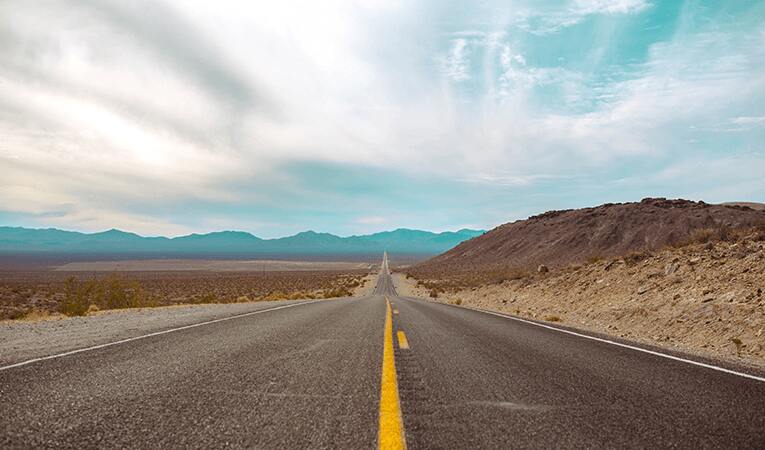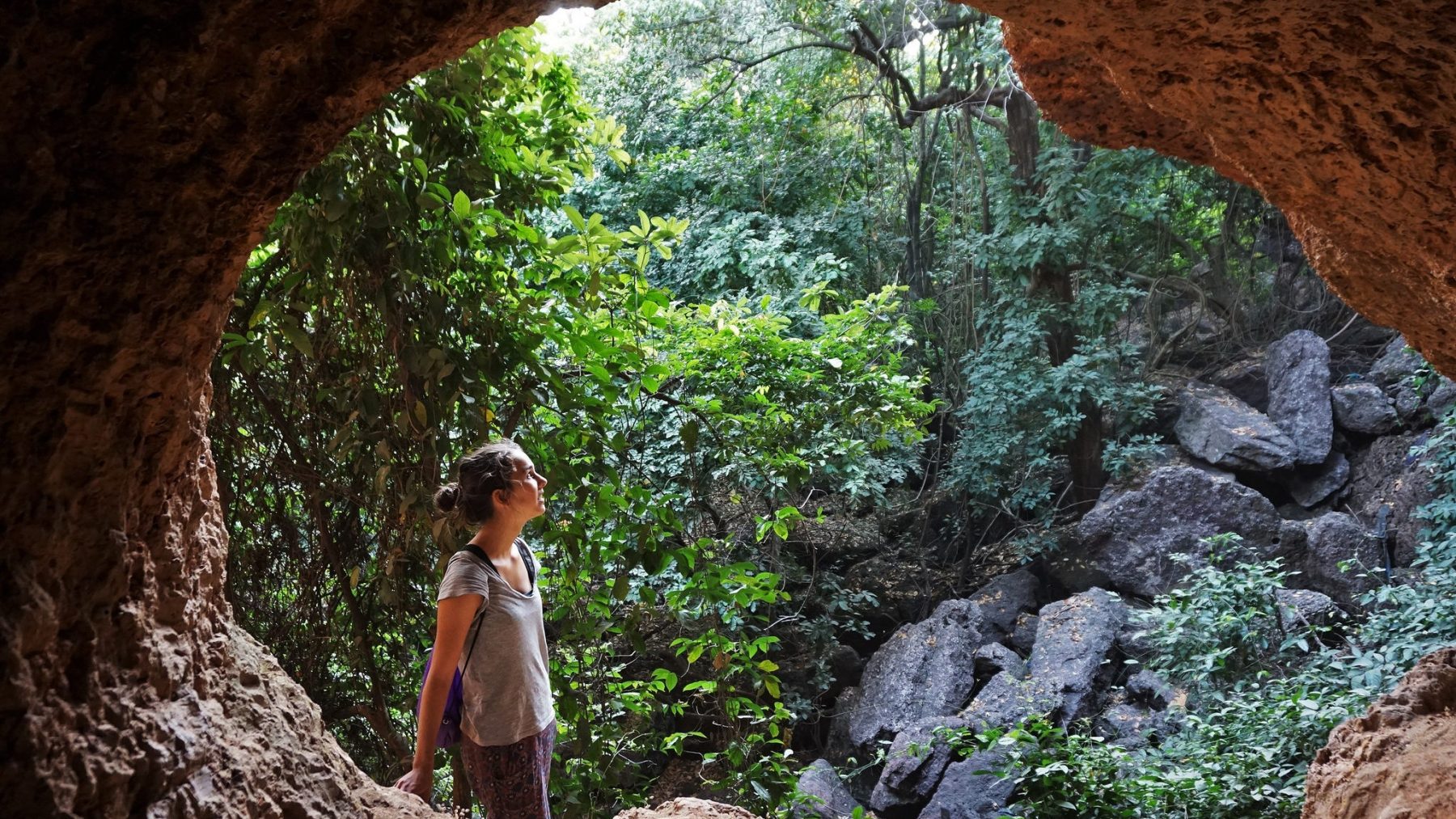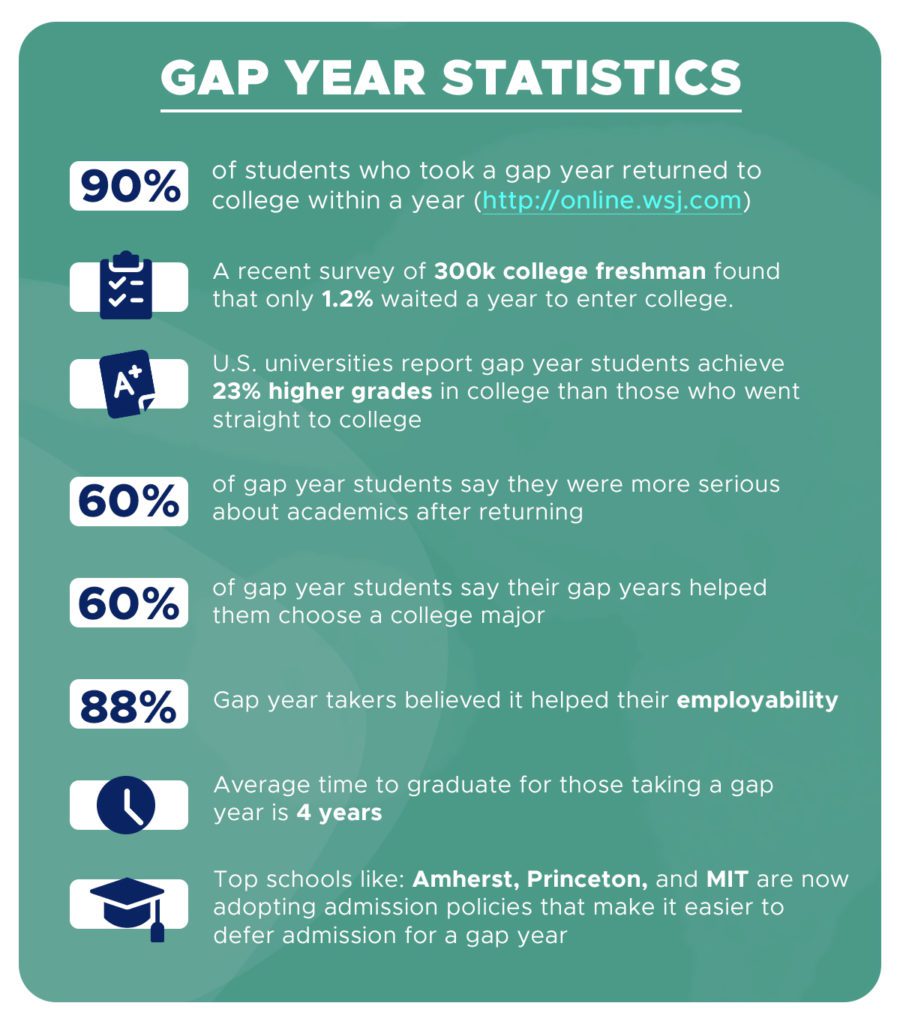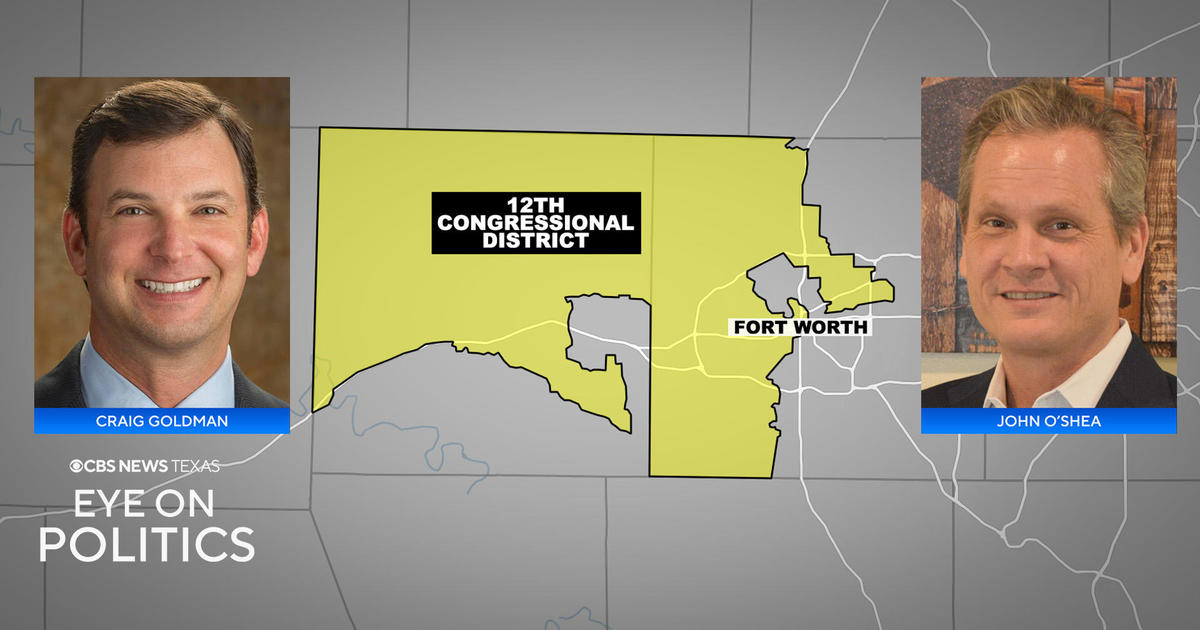
Volunteer in Costa Rica - Change Starts Here

What is a Gap Year & How Do You Take One?
by Danielle DeSimone 3 days ago
As you enter into your final year of high school, all you’ll hear and talk about is: where are you going to university? After dedicating the past few years to endless, difficult schoolwork, clubs, and volunteer work, what university are you planning on going to, in order to continue your studies?
Psst: guess what? There’s an alternative. Rather than immediately going to college, you could go take a gap year to gain some life experience, see the world, and have your own adventures before continuing your studies. Sound intriguing? Maybe a little terrifying? But what is a gap year, actually? Let us convince you by explaining what a gap year is really like.

You’re sitting outside your high school, dreaming of the world outside your AP history class.
What is a gap year, technically?
What is a gap year? The technical gap year definition is, “a period of time, usually an academic or calendar year, in which a student takes a break from school, typically after ending high school and before starting college.” ?
[ Did you know you can get matched with gap year programs for free? ]
But what is the true gap year meaning.
To mom and dad, that might just sound like a way-too-long vacation that they’d be skeptical to send you on, but a gap year is actually an incredible, life-affirming adventure that will not only prepare you for university a year down the road, but also for the great, big real world. ?
A gap year is a chance for you, as a person longing for change (before, during, or after college), to take a year off school to pursue travel, work experience, and/or personal exploration before pursuing further, higher education or a new job/chapter in life.
What is a gap year’s history, you ask? Well, nerd, here’s the abridged version... “Back in the day,” when gap years first started to really become a thing in the 1970’s, they were mostly reserved for Australian students who would pack up a backpack, kiss mom and dad goodbye, and hit the road for a year of travel and wild shenanigans.
Nowadays, you can still have a year of travel and wild shenanigans, but gap years have become so much more. Think beyond just going on vacation! Your gap year can be used to earn some work experience, volunteer abroad, or have an incredible meaningful travel experience. Doing so will not only set you apart as an even more competitive candidate in the following year, when applying for university, but you’ll also expand your worldview! You can utilize your gap year between high school and university to really explore yourself, the world, and what you want out of it.
Alright—I figured out what is a gap year. But did I miss my chance? Isn't it just for teens?
The first thing that might come to mind when thinking about the meaning of a gap year could be the traditional year in between graduating high school and college to pack up that backpack and venture out into the world alone. But there are a few different types of gap years and how you can do them!

Not every road takes you straight through from high school to college to a full time job, kids, and a white picket fence.
Before College
Most people think of a “gap year” as meaning the year that high school students take off in between graduating high school and beginning college. This is a great option for students who are still trying to figure out their interests, or maybe aren’t quite sure where or what they want to study once they arrive at their chosen university. It also gives younger students the opportunity to get a taste of the real world, and really explore on their own. After a year of traveling the world on a gap year, attending a university will seem like a piece of cake.
[ Download your free copy of our gap year before college ebook! ]
During college.
Yes, you can actually take a year off from college! Nowadays, many students will take a gap year in the middle of their collegiate career. Whether you want to get some work experience under your belt, travel and see the world before jumping straight from graduation into more education or a career, or you just need a breather from all that hard work you’ve been doing, taking a gap year in college is perfectly acceptable. It might seem weird, especially since you’ll end up graduating a year later than all of your friends, but just think of all the incredible adventures you’ll have before you even get that diploma!
After College / Gap Year for Adults
That’s right - gap years aren’t just for students. After four+ years of college work, sometimes you just need to take a year to explore the world - and what you want out of it. Or maybe you’re already in the working world, but you feel like taking some time to reevaluate your priorities and career choices.
Taking a gap year after college is a great way for recent grads who are thinking about pursuing further education in a Master’s, or jumping into a fast-paced career, to just have some time to themselves to really think about what they want to do with their lives. It can also be a great way to get work or volunteer experience. But most importantly, it’s an incredible way to see the world at a time in your life when self-discovery and decision-making seem to be the be-all end-all. Taking a gap year after college or as an adult puts things in perspective and hits the reset button, so that you’re ready to tackle anything that comes your way in the future.
[ Find the Best Gap Year Program for You Now ]
What can i do on a gap year.
Long story short, there are a lot of different gap year meanings and ways to do them. Hint: if you don’t want to ambitiously move through 30 countries in 12 months, that’s okay. If you don’t want to do a gap year alone, that’s totally doable. And if you want to make your gap year about something more than just your own personal travel goals—if you want to give back to the world around you—you can do that too. Here are a few different types of gap years you can do:

What is a gap year? It’s about reaching new heights.
Gap Year Solo Travel
If you’re the independent, soul-searching type, you can go on a self-determined gap year of travel. This, of course, means a lot of research in advance so that you can be prepared to travel the world alone (or maybe with a couple of friends), but setting off on the road alone is an incredible experience. Try to make your travels more than just the seeing of sights—really embrace the GoAbroad Meaningful Travel Manifesto and try to immerse yourself in the culture and history of the places you’re traveling to.
Gap Year Travel Programs
If you’d like a little more structure in your life and would like to travel, but not on your own, you can embark on an organized gap year travel program ! Through programs like these, which you can research and compare using MyGoAbroad , you’ll join a group of like-minded students on travels to entire countries or multiple countries. You can participate in short-term programs or year-long programs—whichever fits your budget and travel style better!
You can find amazing gap year travel programs here .
Gap Year Volunteer Programs
Hoping to give back while taking the time to go abroad? There are also a lot of gap year programs that focus on volunteering while you travel, completely changing the gap yar definition! Teach English to rural communities in Peru, learn and work in wildlife conservation in Kenya, work with young girls and women empowerment in India, or find any number of causes that you are passionate about! You’ll find that even though you’re volunteering and trying to help these international communities, you will be the one who is ultimately changed for the better after seeing how other people eat, sleep, and live.
You can find amazing volunteer programs for your gap year here .
Gap Year Work Experience Programs
Yes, you can make that resume a star-studded affair! By working or interning abroad during your gap year , you won’t just build up a really impressive resume - you’ll also be earning some incredible work experience. Before even entering university, you’ll already have had a glimpse of the real working world and what it’s like. This can help you decide what you’d like to study - or even what kind of career - you’d like in the future. And a year down the road, when you’re applying to universities, just think of how impressive it will be for the admissions office to see that you took a year to develop yourself professionally - and while abroad, no less!
You can find amazing gap year jobs here .
Gap Year Language or Cultural Immersion Programs
Traveling through the entire continent of South America in one year is an amazing and life-changing experience, but another alternative is picking one location and immersing yourself entirely in the local culture. Immersive gap year programs such as homestays or language immersion programs allow students to really dig their heels into one, particular culture, where they can learn about the traditions, customs, language, and lives of other people abroad. Not only will you develop your language skills, you’ll also become a much more well-rounded person, after having fully experienced becoming part of another lifestyle and local, international community.

What is a gap year? It’s about sailing new seas and finding yourself.
[Compare gap year programs side-by-side with MyGoAbroad ]
The realities of a gap year.
At first, doing a gap year between high school and college can seem like a crazy cool adventure (which it totally is), but once you start planning it, you may have second thoughts. After all, going out into the world on your own at such a young age can be intimidating, and it’s easy to feel left out and distant from your other friends, who are getting ready to go to school in the fall.
These feelings are completely normal! It’s okay to be nervous and you’ll inevitably feel a little different from your other student friends who are doing the “traditional” route of going from high school to university. But where’s the fun in playing it safe? Despite all the culture shock, the stress of packing, and the challenges of going abroad as a young student alone, doing a gap year abroad will be one of the most amazing, life-changing experiences you’ll ever have. A.K.A., it’s totally worth it, and the adventure of a lifetime.

What is a gap year? You’ll never know for sure until you go!
Some words of wisdom from fellow gappers
"One of the most important things that I learned during my gap year is that you do not have to be super rich to live or travel abroad. There are so many short term work opportunities available in Europe and beyond doing all kinds of cool interesting things for various timeframes as well. And a lot of times you can get room and board for free in exchange for work, which frees up a lot of money to explore on your days off!"
- Quinn Doyle
"I think everyone deserves a gap year but there is something about having a gap year when you are older. Everyone thinks it is meant to be in your late teens or early twenties but at 26 I am having a working gap year and it has been an adventure. Gap years should be at any point in your life when you need to take a step back and see what is important in your life and how you can push yourself to become a better or healthier, happier you."
- Amanda McCullough
"What was really cool about my gap year is that my biggest life lessons came from the culmination of all of the smaller, everyday life type of situations I had to deal with. I never had any earth-shattering life realizations or growth experiences from spending a couple of days in a new city, but I learned so much about myself from how I dealt with the little daily challenges I faced during my year living abroad, like going grocery shopping where you don't know the language, not being with family for the holidays, and making new friends in a foreign city where you don't know a soul. Those kinds of experiences are the things that push you and expand your comfort zone, which you will have for the rest of your life!"
- (also) Quinn Doyle
[Now That You Know What is a Gap Year, Here's Why Take a Gap Year ?]

What is a gap year? It’s late night trains and early morning laughter.
7 recommended gap year programs that make it all possible
Feeling inspired yet? There are thousands of gap year programs out there for high school students, so it might seem a bit overwhelming to narrow them down! Here are a few gap year programs that make all your dreams come true, to get you started!

1. Carpe Diem Education
Looking for a challenge? Carpe Diem Education is the gap year program for you. These programs are specifically designed to facilitate personal growth, and to really teach program participants about cultural exchange and the communities they are living with abroad. After participating in a Carpe Diem Education program, you won’t just have a better grasp of yourself - you’ll have a better understanding of the world, and how to travel through it as a responsible and service-minded global citizen.
- Popular countries: New Zealand
- Popular projects: South Pacific Year Program , East Africa Program , Latitudes Year
- Related: Read Carpe Diem Education reviews | Visit their site

2. GVI Programs
As one of the most popular alternative travel program-providers out there, GVI Programs gives high schoolers incredible experiences that most students don’t get to reach until college, or beyond. Think, conservation work on sea turtle nests and learning about how to promote sustainability in small communities.
- Popular countries: Greece, Thailand
- Popular projects: Marine Conservation Awareness , Women’s Empowerment Volunteer Programs
- Related: Read GVI Programs reviews | Visit their site

3. Where There Be Dragons
Step off the charted map with Where There Be Dragons ! With this program, participants can choose multiple semester programs in different regions to put together one, incredible gap year experience. Where There Be Dragons programs are all about adventure and pushing your limits, so if you’re up for trekking over 16,000 foot passes in the Andes, traveling ruggedly, and living with the locals, these might be the programs for you.
- Popular countries: Madagascar , Indonesia
- Popular projects: South America: Andes & Amazon , Nepal: Himalayan Studies
- Related: Read Where There Be Dragons reviews | Visit their site

4. Pacific Discovery
For faculty-led programs that focus on teaching students and gap year program participants about the world around them - whether that be through local culture, wilderness conservation, or service. It’s all about the educational grassroots with Pacific Discovery programs, where you can combine multiple semesters to create an amazing, globe-trotting gap year!
- Popular countries: Nicaragua, New Zealand, Tibet
- Popular projects: Central America Gap Year Program , Nepal and Tibet Gap Year Program
- Related: Read Pacific Discovery reviews | Visit their site

5. Winterline Global Education
Okay, so you don’t just want a gap year abroad. You want adventure. You want real-life skills that you can use in your future life - or to survive in the wild. From filmmaking to first aid, from kayaking to cooking to conflict resolution - Winterline Global Education has it all. This is not your average gap year program.
- Popular countries: Costa Rica, Belize, India, Cambodia
- Popular projects: Central America, Europe/USA
- Related: Read Winterline Global Education reviews | Visit their site

6. Greenheart Travel
Greenheart Travel’s programs partner with local governments, institutions, and organizations to provide their students with true cultural exchange, and promote a sustainable, global community through responsible work and volunteering.
- Popular countries: Japan, Sri Lanka, Norway
- Popular project: Immersive Study Abroad
- Related: Read Greenheart Travel reviews | Visit their site

7. Cross Cultural Solutions
An award-winning program provider, Cross Cultural Solutions gives students the real deal when it comes to cultural immersion. If you’re willing to dive headfirst into a homestay to learn the language, culture, and traditions of another country all on your own, this might be the program for you.
- Popular countries: Peru, Tanzania, India, Guatemala
- Popular projects: Full Gap Year Abroad, Spanish Immersion Gap Year
- Related: Read Cross Cultural Solutions reviews | Visit their site
[Not quite what you're looking for? Browse all gap year programs here .]

Write your own gap year definition. Write your own story.
Ready to take a year ON?
Now that you know what is a gap year, you get to choose what kind of gap year you’d like to take on. Making the decision to take a gap year is an exciting but kind of scary one! You’ll definitely be sailing into uncharted territory, and it might be strange to go off into the world and travel on your own, while your friends stay home and go to university. It’s okay to occasionally feel left out as everyone starts preparing to decorate their dorms or memorize their class schedules. Instead, you’ll be tackling something incredibly challenging, but rewarding, and you’ll emerge on the other side even more prepared for college.
So, start planning that gap year and boarding those planes—adventure awaits!
Find gap year programs now

Want to Get Matched with Programs?

Use MyGoAbroad to Save & Compare Programs!

Join an impactful gap year exploring South Africa, France & Thailand!
Related Articles
What is a sabbatical 7 things to know, how to plan a sabbatical, the best advice for taking a gap year in latin america, 10 sabbatical ideas (for making the most of your time), how to take a year off work to travel, why americans don’t take gap years (and why they should), popular searches, recommended programs.

Seamester Study Abroad at Sea

1675 reviews
International Volunteer HQ [IVHQ]

Carpe Diem Education
For Travelers
Travel resources, for partners.

© Copyright 1998 - 2024 GoAbroad.com ®
- Study Abroad
- Volunteer Abroad
- Intern Abroad
- Teach Abroad
- TEFL Courses
- Degrees Abroad
- High School Abroad
- Language Schools
- Adventure Travel
- Jobs Abroad
- Online Study Abroad
- Online Volunteer Programs
- Online Internships
- Online Language Courses
- Online Teaching Jobs
- Online Jobs
- Online TEFL Courses
- Online Degree Programs
How a Gap Year Prepares Students for College
More students are taking a year off after high school to explore their interests.
What Is a Gap Year?

Getty Images
Traveling and focusing on personal development are common ways students spend their gap year.
While many students head directly to college after graduating from high school, a smaller cohort chooses an alternative: a gap year.
What may have previously been seen as an unconventional path has become more accepted in recent years, particularly since the COVID-19 pandemic. When colleges either shut down or moved to virtual learning, many students opted to defer enrollment and take a gap year, experts say.
The Gap Year Association, an Oregon-based nonprofit that helps students access gap year opportunities, estimates that on average, between 40,000 and 60,000 students take a gap year each academic year. That number rose to an estimated 130,000 students during the 2020-2021 school year, according to the organization. High school counselors, students and parents are becoming more aware of the variety of options after high school and seeing the benefits of taking a gap year, says Jennifer Sullivan, founder of Fast Forward College Counseling.
“It’s not an all-or-nothing now,” she says. “You’re not just going to college or you’re going to work. There’s a lot of in-between. There’s a lot of gray area where some students do choose to take a gap year or to take a gap semester, then decide that they’re ready.”
The Gap Year Association defines this educational interlude as "a semester or year of experiential learning , typically taken after high school and prior to career or postsecondary education, in order to deepen one's practical, professional and personal awareness." Some students elect to take a gap year in the middle of pursuing a degree.
Typically, students use this time to travel, work or volunteer and figure out what they want to study when they do eventually go to college, experts say. Some students may be experiencing burnout and are taking a break to focus on their mental health.
While experts say the concept has long been popular in Europe, it has grown in the U.S. more recently. One major boost came when former first daughter Malia Obama announced in 2016 that she would take a gap year before attending college, which caused the term to spike in Google searches that spring.
Experts suggests the move not only introduced many students to the concept but gave them social permission to pursue it.
“A gap year, if done right, can position you really strongly for college,” says Cathleen Sheils, senior associate director of college counseling at New York-based Solomon Admissions Counseling.
How Gap Year Experiences May Vary
For high school students or graduates considering a gap year, the options are plentiful and include structured programs or self-guided exploration.
The Gap Year Association, which accredits numerous programs , lists experiences with a focus on ecology, animal welfare and conservation, language studies, coding, cultural immersion and a variety of other topics.
Another option is AmeriCorps, which offers a number of service programs throughout the country for those 18 or older. Students who participate are eligible for benefits such as a living allowance and an education award that can be used to pay off loans or put toward future tuition.
Students may also elect to work during a gap year, either to make money for college or to earn college credit through an internship.
"The best gap years tend to be the ones that push students to think about who they are and their role in the world," says Joe O'Shea, associate provost and dean of undergraduate studies at Florida State University and author of "Gap Year: How Delaying College Changes People in Ways the World Needs."
O'Shea says a gap year can help motivate and inspire students and better prepare them for college. He notes that the "natural break" between high school and college is an ideal time for students to "pause and reflect" and explore options before their studies begin.
"Often you see students who struggle in higher education because they don't have a sense of purpose and direction," O'Shea says. "Gap years – because they give students a broader sense of the world and their place in it and how they can contribute – help to supply and empower students with the kind of motivation and purpose that can animate their entire college experience."
How a Gap Year Affects College Admissions
If students are considering a gap year, they should go through the college application process as a high school senior as if they're planning to attend right away, rather than waiting to apply during the gap year. It's much easier to complete college applications when students are still in school and have the help of counselors and teachers, says Colleen Paparella, founder of DC College Counseling.
O'Shea suggests that high school students considering a gap year research whether the colleges they're interested in support that effort.
Experts typically recommend that students not divulge gap year plans on their college applications or before being admitted. But students can reach out to admissions offices to find out their general policy on gap years. “We definitely tell them this is not something you want to advertise at the time that you’re applying, because that’s not going to make you a more attractive candidate,” says Paparella. “Not to say they won’t get in, but it’s just going to make things more difficult.”
After being admitted, students might want to have a formal conversation with an admissions officer about considering a gap year.
While it's rare for colleges to deny a gap year request, it's common for them to want more information about why the student is taking a gap year, and they may require paperwork, Paparella says. Some schools have policies for how students can take their gap year. They might require students to check in mid-year to make sure the plan is still on track, or they could stipulate that students can’t take classes at another institution, she says, as that could possibly change their status to a transfer student.
Generally, students can then defer enrollment, paying a deposit to retain their spot and enrolling after their gap year. Keeping in mind that the decision day for most colleges is May 1, Paparella says students should wait until they are absolutely certain about taking a gap year to fill out any forms from the school, but to still be cognizant of their timeline to allow for alternate plans to be made.
“Somebody who feels like a gap year is a great idea in September of their senior year might feel very differently eight months later,” she says. “We say just keep your options open. Don’t disclose that now, and when you’re sure you want to do it and you have schools you’ve been admitted to, you can go ahead and ask for a gap year.”
Some students, however, take a gap year because they weren't admitted to their desired school but are intent on attending that institution. A gap year is a way for those students to rebrand themselves and stand out among other applicants. Those students will reapply either during or following their gap year, says Sheils, who previously served as director of admissions at Cornell University .
Colleges expect to see more maturity and perhaps more direction from those applicants, she says, and there needs to be some connection between how students spent their gap year and their future academic goals.
“Not every gap year is created equally or is seen by admissions officers as credible,” she says. “What you’re looking for is, what did they do during that gap year to actually grow their academic profile?”
How to Know if a Gap Year Is Right for You
Students should not take a gap year simply because they're putting off their next step. Whether their plan for that year is to work, travel or recharge mentally and emotionally, students should have a specific reason for taking time off.
“They need to have a very clear idea in mind about what they’re going to do afterwards," Paparella says. "I would definitely never do this and keep it open-ended at the end. That’s not going to work.”
Some students, Sullivan says, are deterred from taking a gap year because they don't want to be behind their peers academically and socially. Some might regret missing out on certain college experiences that their friends are having.
Experts say students should determine what motivates them, what their long-term goals are, and whether or not they can make it work financially. Formal programs offering travel or internship opportunities can cost more than $50,000 on the high end, although students may pay less due to scholarships and other financial aid, O'Shea explains. And for low-income students, certain programs may be subsidized to enhance affordability.
O'Shea notes the need in higher education to support gap year students and points to scholarship funding from FSU that aims to do so through its Gap Year Fellows Program. He believes such initiatives are making the gap year concept more available to students with limited financial means. While gap years have been the domain of middle-class families and above, O'Shea thinks that is changing as enrichment programs become more affordable.
Money aside, students need to determine how a gap year will ultimately help them.
"I have worked with individuals who have taken a gap year to focus on their mental health or passions (such as art or teaching English abroad), which has helped them gain perspective, different skills, and mature emotionally before returning to academics," Lindsey Giller, a clinical psychologist with the Child Mind Institute, wrote in an email. "These individuals can then begin school with newfound confidence that may not have been possible had they gone to college straight from high school."
Searching for a college? Get our complete rankings of Best Colleges.
25 Best Jobs for High School Graduates

Tags: education , colleges , college admissions , students , Travel , Coronavirus
2024 Best Colleges

Search for your perfect fit with the U.S. News rankings of colleges and universities.
College Admissions: Get a Step Ahead!
Sign up to receive the latest updates from U.S. News & World Report and our trusted partners and sponsors. By clicking submit, you are agreeing to our Terms and Conditions & Privacy Policy .
Ask an Alum: Making the Most Out of College
You May Also Like
Law schools with the highest lsats.
Ilana Kowarski and Cole Claybourn April 11, 2024

Today NAIA, Tomorrow Title IX?
Lauren Camera April 9, 2024

Grad School Housing Options
Anayat Durrani April 9, 2024

How to Decide if an MBA Is Worth it
Sarah Wood March 27, 2024

What to Wear to a Graduation
LaMont Jones, Jr. March 27, 2024

FAFSA Delays Alarm Families, Colleges
Sarah Wood March 25, 2024

Help Your Teen With the College Decision
Anayat Durrani March 25, 2024

Toward Semiconductor Gender Equity
Alexis McKittrick March 22, 2024

March Madness in the Classroom
Cole Claybourn March 21, 2024

20 Lower-Cost Online Private Colleges
Sarah Wood March 21, 2024

Gap year travel

- 1.2 Itineraries
- 2.1 By plane
- 2.2 By train
- 2.3 By boat
- 5.1 Before you go
- 5.2 On the road
A gap year is an extended break that some people take at a life transition, such as between studies, between study and work, or between careers.
There's no need for such a trip to be precisely a year, of course, but a year is a typical length of time for people who have just finished secondary school: they typically have to delay university entrance for a year to take the time off. Some of the same principles can be applied to just a summer between school and college, or any extended break "between jobs".
This article discusses options for low budget long-term travel of the type that a gap year traveller might be interested in. See Volunteer travel and Working abroad for more general but related discussion.
Prepare [ edit ]
Pre-departure planning is important. No matter how much you plan for the trip there may be instances where you have to throw all the planning out the window. However, there are certain things you should watch for and plan for:
Visas [ edit ]
Check with the appropriate consulate or embassy in your country to find out if you will need a visa to visit the country of your destination, especially for an extended period of time. Some countries have extremely detailed and complicated entry/departure laws, and treat visits of a week or two very differently from longer stays. Some pairs of countries have an agreement for working holiday visas which allow a citizen of one to work in the other for a limited time.
The IATA Visa Database , provided by Delta Air Lines, is an excellent place to check whether you need a visa or not. That database is what airlines rely on; if it says you need a visa and you do not have one, then they will not let you on the plane. Many will not refund the ticket either; they consider visa troubles your problem, not theirs.
The need of a visa also depends on what you are going to do; even if tourists may be visa exempt, travelling for studies, volunteering or work (or anything that may be regarded as such) can require the appropriate visa.
To get a visa for work or studies you probably need a letter from the employer or institution, and possibly other paperwork. Details vary. Such other kinds of visa may take several months to process, check in time.
Itineraries [ edit ]
Itineraries are important for two people: the traveler and the traveler's family. Some parents will be more supportive of allowing their son or daughter to go abroad if they know where they'll be. An itinerary may be helpful in the event that an emergency happens and somebody needs to contact you while you're away, and helps to satisfy a parent's instinctive need to know where their children are. An itinerary describes the route of the journey or tour or the proposed outline of one.
Money [ edit ]
Since gap year travellers are gone for long time, forfeiting their work income, they usually need a tighter weekly budget than they would have as holiday travellers.
If you're traveling to one area, check the cost of living there. If it's high you'll probably want to budget more carefully and save some money before leaving. The lower the cost of living the less you'll have to save, but be sure to have a back up reserve in emergency cases.
Consider opening a second account in your home country and allow your parents or a close relative to have access to the account. In the event that you have to come home early they can withdraw money from the account, which can be used to purchase a return ticket for you – or the other way around. Consider whether making the accounts as independent as possible makes sense. In some situations, such as if your ATM card gets stolen or compromised, it can help to have access to another account, but this can also make things overly complicated. Some cash in a secure place can help in similar situations.
Timing [ edit ]
Gap year travellers are less dependent on time management . At major holidays and tourist seasons, both transportations and venues are overcrowded and expensive. If you have an empty schedule, visiting tourist destinations off-season on weekdays will save both money and effort.
Get in and around [ edit ]
If your gap year is going to involve several stops in several different countries and continents, you should look into the many budget tickets designed for long term travel. Gap year travellers are often referred to as backpackers and will often receive discounted travel. Examples include:
By plane [ edit ]
Open ended return tickets allow you to come home at any time within a given period (often a year, sometimes six months, rarely 60 days.) They're generally more expensive than regular discount round-trip tickets, but generally much cheaper than a fully-flexible/refundable round trip (or two one ways, except on some routes where there are the inflexible discount one-ways.)
Open-jaw tickets allow you to return from a different city than the one you flew into, and may be worth saving you the cost and time of returning to the city you started in; fares will be highly variable - in the best case, the cost will be in essence the average of two discount round trips, in the worst it will be comparable to two one-way tickets. It always pays to check for yourself in these cases.
If your travel plans are more ambitious than that, round the world flights might fit your needs.
Some options and issues:
- Most major airlines schedule flights out to 330 days out, rather than a full year.
- While it's generally possible to change discounted tickets for a fee to allow more time, most discount fares have a limit on their time of validity (often 30 or 60 days, sometimes 6 months) and exceeding it will often result in a very large increased fare on top of the change fee.
- This can also be handy if your travel plans are open, but border crossing or visa rules require proof of an onward ticket (alternatively, look at low-cost carriers within the region.)
- Also with legacy carriers, never "toss" or skip a middle segment of a single ticket without formally cancelling it, as a no-show segment will result in cancellation of later segments. Cancellations in advance may or may not be allowed, and if allowed will often require paying a change fee or fare difference. Low-cost carriers are often more flexible on this – check with the individual carrier for their rules.
- In some cases for legacy airlines, it's cheaper to buy tickets departing from within the developing world from the airline or local travel agency after you get there, rather than directly from an airline or from a travel agent at home. This is almost never the case with low-cost carriers.
By train [ edit ]
There are long term train tickets aimed at backpackers and travelers. Sometimes these will let you travel more cheaply than any local fares. Examples include the Interrail and Eurail passes in Europe and the Backpacker rail pass [dead link] in Australia. For travelers in North America, see Rail travel in North America .
By boat [ edit ]
A less common option is to go for a cruise with a boat of your own (or as crew with somebody else). For a year of travel this often means crossing oceans, which requires solid skill and experience, at least if you are in charge, and commitment regardless. A yacht cruise of a few months is quite feasible also along coasts or inland waterways, with somewhat lesser requirements on you and your boat.
On a long cruise, you probably want to spend quite some time in places you like. The main marina may not be the cheapest option, and the marina may have special offers for long time stay, at least off season. There are several ways to cut down living cost with a city in reach.
If staying a long time in a single country (abroad, or with a foreign flag), check customs rules etc., as you probably don't want to have to pay import taxes. In Europe, all of EU counts as one country in this respect.
By car [ edit ]
If you take your car with you, you probably want to be able to camp to maximize your liberty. You'll at least want a tent that suits the local conditions (weather, pests) and a camping stove (for which fuel is available locally). These can be bought locally or brought in.
Foreign cars and driver's licences are accepted in most countries, for a limited time. In some cases buying a local car and bringing it back makes sense, at least if you can work the tax and duty system to your advantage. You could also buy a used car cheaply and sell it when leaving, but this includes many pitfalls, both in avoiding lemons, and tax-wise.
By bus [ edit ]
Work [ edit ].
A long trip may be impossible to save for in advance. Often gap year travelers want to support their journey by taking work, often of a low-skilled and/or intermittent nature. Unfortunately, working in other countries often requires a work visa. Typically these are onerous for gap year travelers: you need to find an employer to apply for the visa, the visa is expensive, and the employer must show that they cannot hire someone with your skills locally. The work visa will be tied to your term at that employer. However, there are some visa schemes and work schemes that cater specifically to those who are looking for a job to support their travel.
If you are a citizen of certain countries, you can work in some other countries without needing a visa at all:
- citizens of a European Union country can work in other EU countries without a visa
- citizens of Australia and New Zealand can each work in the other country without a visa
Gap year travelers who are under 35 should look into working holiday visa arrangements where you can go to a country for a certain period of time, often 12 months and sometimes up to 24, and work intermittently. The intention of the visa is that you work to fund your trip, and there will typically be restrictions on your working, including: not working for more than a certain amount of time during the visa period, not working for any one employer for a long period, working only in specified industries and sometimes not working in jobs that further your career path.
These are typically reciprocal arrangements: your country will offer visas of this sort to citizens of certain other countries and those other countries will do the same for you. Hence it is best to check with your own country's foreign affairs officials to see if you have reciprocal visas, and if so, with which countries.
See Working abroad for suggested employers and industries, Teaching English for one type of job, and Volunteer for volunteer opportunities.
Learn [ edit ]
An increasingly more popular option for those planning a gap-year is to travel and learn . This is especially popular with school leavers, allowing them to take a year out before university, without compromising their education. In many cases, enrolling on a gap-year course abroad can actually improve your chances of moving into higher education back in your home country.
Typically there will be a tuition fee to enroll in these educational programs. There are two reasons for this: firstly, many of these courses are run by private institutions, and secondly, because international students rarely attract government funding.
There are a number of organisations offering gap year educational programmes.
If you are enrolled already, you may have the opportunity to study a semester or a year as exchange student, at an institution your university or department has cooperation with, or through multilateral programmes, such as Erasmus . The studies may be in a speciality directly relevant for your exam or on separate related subjects. Some universities offer self-contained cross-subject packages for exchange students, to be added to your exam (such as studies on human rights and related issues, or on the region of the country). The exchange is usually not targeted at first-year students.
Cope [ edit ]
It is every traveler's dream to take an extended trip - whether it's three months in Europe or a year of around the world adventures. The first thing to realize when considering a long trip is that travel can be hard work. A trip isn't the same as a vacation and can often be more taxing than the work or school that you're leaving behind. A long trip can involve dozens of new places or an extended stay in just one or two. In either case there will be the daily challenges of functioning in a new environment. Things as simple as buying a bus ticket or fresh vegetables at the grocery store need to be relearned - often again and again.
Before you go [ edit ]
- Talk to other people who have done a trip similar to the one you are planning. If you don't know anyone personally, try any of the dozens of online travel web sites full of first-person travel stories covering every possible type of trip.
- Plan big and loose . Read everything you can about the area you will be visiting. There may be sights and attractions you didn't know about. A rough outline of your trip might have three or four target points and a variety of ways to get between them. You don't want to find out that the weather isn't what you thought, or the guide book was incorrect, after committing to 6 weeks in a specific spot. Some trips will allow you more leeway than others. Travel plans in Asia can often be made day-by-day while summer travel in Europe should be organized at least a few weeks ahead, unless you're prepared to hunt around for hotel rooms and train seats.
- Set up a pre-trip time-line so you don't end up with a full todo list your last week of work or school. Things to consider are doctor's visits for a check up, inoculations, and prescription refills; purchasing plane tickets; renewing passports and obtaining visas and other documents; checking your insurance coverage abroad and purchasing additional travel insurance if needed; and don't forget visiting friends and family members!
- The longer the trip, the lighter you should pack . This might seem counterintuitive, but it's true you can afford to lug a heavy bag around for a week or two, but do you want to have anything extra for a year? Stick to the absolute basics and know what you can and cannot buy at your destination(s). There's no point in bringing 6 months of toothpaste to Europe or buying a sarong at home to take to the tropics. If you are visiting several climates, try to arrange it so you visit the warmer places first and coldest last. That way you can purchase sweaters and long pants and not have to carry them any more than needed. Alternately, visit cold climates first and then ship unneeded layers home – or sell them off. A good rule of thumb is to bring one outfit for the hottest day you're likely to encounter, one for an average day, and one for the coldest. Make sure everything goes with everything else (if that's important to you), and remember that layers are always best.
- Be prepared for uncomfortable trips . You will often find yourself in a busy, cramped, economy class environment and it could be for many hours – especially long plane trips and long bus trips. If you want to arrive at your destination refreshed and able to enjoy the sights, then try a good quality travel pillow to support your head, some ear plugs to block out the screaming babies, and an eye cover to block out the sun or cabin lights. Just avoid those cheap U-shaped pillows from airport shops – your head drops forward and you wake up with a stiff neck.
- Plan your trip around activities , not just sights. Looking at every church in Paris or every temple in Katmandu can quickly turn into a blur of monotony. Activities such as cooking, language classes or volunteer work can keep you from turning into a spectator in your own adventure.
- Make contact with the locals before you go. Maybe you have a friend-of-a-friend or a foreign exchange student from high school you remember, or just found a friend through a travel web site; almost everyone is happy to welcome a foreign visitor to their home town. This might be as elaborate as a home-stay for a few weeks, or just coffee in their home or dinner at a local restaurant.
On the road [ edit ]
- Keep a travel journal . This can be as simple as a list of dates and places or as complex as a full diary and scrap book. Looking back over your trip can bring back amazing memories that might otherwise be buried under new sights and experiences. Set a time each day to write - over breakfast or an evening cocktail are both good times to step back and reflect on all you've accomplished. If you are traveling alone a journal can be a companion to confide or complain to. Journals are also great ways to give advice to other travelers by recording recommendations or criticisms of hotels, restaurants, and travel services.
- Budget time and money to treat yourself along the way: living hand-to-mouth just to add an extra week or month to your trip can sometimes drain the joy out of the entire venture. A special meal once a week, or a night at the movies once in a while.
- Take vacations from your trip - and travel partners: look for local treats like sauna and massage in South East Asia or hot springs in Europe. Sometimes a few hours of indulgence can recharge your travel batteries. Plan a few days or hours each week where you and your travel partners can have some time alone. This will help ensure you remain happy to see each other for the rest of the journey. Two people can see more than one, and this way you'll have something new to talk about over dinner.
- Vary your style . It's easy to get into a rut on a long trip - always the same sort of hotel, always the same mode of transportation and soon every place starts to look the same. If you're an independent traveler, try taking a guided tour - you'll make friends and find out new things about the places you're exploring. If you're usually a tour groupie, strike out on your own for a day or two and find adventures off the beaten path. Many travelers buy one guidebook before they leave and stick to it like a holy book. Think about trading guidebooks with a fellow traveler for a day (or forever). One night spending a little more or a little less on hotels, restaurants, and transportation can show you a whole new side to a city. Even just seeing a different time of day can keep the days from running together. Night owls might be surprised at what's going on at day break - especially at local marketplaces or just watching the morning commute from a cafe.
- Make a basecamp : pick a central transportation hub (someplace with a lot of travel resources and cheap plane or train tickets. You can use this as "home" even if you only spend a few days there. Pack several different small bags for each park of your trip and keep them in a locker or left luggage in your "home town". After each portion of your trip you can stop by, rest up for a few days, and grab another bag for the next part of your trip.
- Learn a language : a long trip is the perfect time to really get to know a culture and its language(s). Even if you are planning on visiting several countries, pick one that you have always been interested in and set a goal of learning as much as you can.
- Bring your hobbies : doing any activity, even traveling, all the time can get boring quickly. Find something you enjoy and make that the point of your trip. Bring a musical instrument and play it in every park, learn a local board game like Chinese chess and play with a new person everyday. Any interest can be the backbone of your adventure: follow in the footsteps of a historical or literary figure, journey from the ancient past to the present looking at art or shipbuilding or military costumes, learn a new recipe every week.
- Leave the guidebook in the hotel room: try showing up in a new town knowing nothing about it. What do you find there? What do the locals suggest going to?
- Get some exercise . Exercise helps you maintain a good mood.
- Socialize . Other travelers are easiest to meet and will probably be most amenable to befriending you while you're passing through.
- Stay in touch . Reach out to people back at home every so often.
- Know your travel partner . After a long trip, two great friends can easily turn into two great enemies, and this will make for a much longer trip. A way to find a good traveling partner is to pick one with whom you have had a fight, so you have seen them at their worst.
- Has custom banner
- Articles with dead external links
- Outline topics
- Outline articles
- Reasons to travel
- Topic articles
Navigation menu

- What's a Gap Year?
- Gap Year Benefits
- Board of Advisors
- Board of Directors
- Mission, Vision, & History
- News & Blog
- Planning A Gap Year
- Safe Travel
- Cultural Travel
- Cash & Communication
- Financial Aid
- Data & Benefits
- Navigating College
- Testimonials
- Favorable Colleges
- AGA Scholarships
- AGA Accreditation
- College Counselors
- University Admissions
- Member Log-in
- Standards & Acccreditation
WHAT'S A GAP YEAR?
A gap year is a structured period of time when students take a break from formal education to increase self-awareness, learn from different cultures, and experiment with possible careers. Typically these are achieved by a combination of traveling, volunteering, interning, or working. A gap year experience can last from two months up to two years and is taken between high school graduation and the Junior year of their higher degree.
Gap Years originally started in the United Kingdom in the 1960's as a way to fill the 7 or 8 month gap between final exams and the beginning of university. The intention in the UK for that time was to contribute to the development of the student usually through an extended international experience.
Gap Years came to the United States in the early 1980's through the work of Cornelius H. Bull, founder of Interim Programs. Since it's transition to the United States, Gap Years have taken on a life of their own - now embodying every manner of program and opportunity imaginable, both domestically and internationally, all with the shared purpose of increasing self-awareness, learning about different cultural perspectives, and experimenting with future possible careers.
Since the 1980's many articles have been written about Gap Years, but perhaps most notably is the article primarily attributed to Harvard's former Dean of Admissions, William Fitzsimmons entitled " Time Out or Burn Out for The Next Generation ." Since then, numerous books and articles have been written, most famously: "The Gap Year Advantage" by Rae Nelson and Karl Haigler. Please refer to our Reference Section for other great books and articles about Gap Years in the US.
Parents & Students | Educators | Members | Resources | About Us
1529 N. Killingsworth St., Portland, OR. 97217 · Ph. 503-206-7336 · Fax. 866-903-1077 Mon - Thurs: 8AM - 4PM · Fri: 8AM - 12PM
- Credit cards
- View all credit cards
- Banking guide
- Loans guide
- Insurance guide
- Personal finance
- View all personal finance
- Small business
- Small business guide
- View all taxes
The Guide to Gap Year Travel Insurance

Many or all of the products featured here are from our partners who compensate us. This influences which products we write about and where and how the product appears on a page. However, this does not influence our evaluations. Our opinions are our own. Here is a list of our partners and here's how we make money .
Table of Contents
What is gap year travel insurance?
What does gap year insurance cover, what’s excluded, how much is gap year travel insurance, recommended gap year travel insurance companies, if you’re considering gap year insurance.
A gap year usually refers to a time period when high school graduates take a year off to travel the world before going to college. However, it’s not just for the young'uns anymore. A sabbatical to recover from work burnout, a faith-based mission trip or a language learning opportunity all can be reasons to take a gap year as an adult.
No matter how old you are, if you’re planning to spend a prolonged period of time traveling, it’s a good idea to look at your options for gap year travel insurance.
Gap year travel insurance covers you when you leave your home country. Most gap year travelers don’t return home until their trip has ended, so a single-trip policy is usually the best option. (Multi-trip or annual policies typically cover those who take several shorter trips and return home throughout the year.)
These policies usually last for up to 180 days, but can sometimes be renewed if you’ll be traveling for longer. Gap year insurance plans also provide coverage for visits to multiple countries during your time away, so you’re not limited to just one destination.
» Learn more: What to know before buying travel insurance
As is the case with regular travel insurance, the coverage depends on the specific policy you buy. That said, gap year insurance typically provides the following coverage:
Baggage insurance.
Emergency medical insurance.
Emergency medical evacuation and repatriation.
Trip cancellation and interruption.
Trip delay.
Baggage insurance
If you’re planning to be gone for several months to a year, your bags probably contain a lot of stuff — and you likely have some pricey gadgets, too. So, if the airline loses your checked luggage or your camera is stolen, you can make a claim with your gap year insurance.
Keep in mind that reimbursements for electronics have limits, and you need to show a receipt for the item if you make a claim.
» Learn more: The guide to baggage insurance
Emergency medical insurance
This is probably the most important kind of coverage you can get for yourself. Whether you get injured abroad, need medication or end up hospitalized, emergency medical coverage can save you from paying for medical care in a foreign country.
After the bills pile up, you’ll be thankful you had medical coverage.
Emergency medical evacuation and repatriation
If something goes really wrong with your health and you need to be evacuated to a medical facility in your home country or, God forbid, you die and your remains need to be transported back home, emergency medical evacuation and repatriation coverage will cover the expenses associated with the transport costs.
Trip cancellation and interruption
Unless you have a crystal ball, you never know what’s going to happen during your trip. Trip cancellation and trip interruption coverage applies when a natural disaster strikes, a family member gets sick or dies or when you’re hospitalized before a trip begins.
It can help you recoup some of the costs associated with canceling your trip entirely or returning home unexpectedly.
If your flight is delayed or you miss a connection and have to stay overnight, you’re covered against reasonable expenses, such as meals or accommodation. To be eligible, the delay needs to be more than a specific period of time — usually six to twelve hours, depending on the policy.
» Learn more: How to book a flight that (likely) won’t get canceled
Gap year travel insurance has a lot of exceptions when it comes to coverage. Read policies carefully to determine what is covered and what isn’t.
Although it’s not an exhaustive list, here are some common exclusions to be aware of:
Adventure activities. Adventure sports, like scuba diving, snowmobiling or bungee jumping, usually aren’t covered. You have to add an adventure pack or a sports rider to an existing policy to be covered if something goes wrong. These types of add-ons are not available via every provider.
Being under the influence. Pretty much all gap year policies exclude coverage for accidents that happen when you’re under the influence of drugs or alcohol. Keep that in mind when you decide to go cliff jumping after one too many shots of whisky.
Countries deemed unsafe for travel. If you’re extra-adventurous and trips to more stable countries aren’t doing it for you, kudos to you, but remember that a trip to an active war zone isn’t going to be covered by a gap year plan.
Pre-existing conditions. Unfortunately, certain pre-existing medical conditions aren’t covered by most gap year plans.
If you have a pre-existing medical condition, you may still be able to get coverage for it, you’ll just have to purchase a separate plan .
The price of travel insurance will depend on where you’re traveling, what you want covered and your age.
Let’s take a look at a couple of plans from World Nomads, its coverage limits and costs. In the example below, the insurance is for an 18-year-old traveling to Europe for 180 days.
For this traveler, there are two options available: the Standard plan and the Explorer plan. While the Standard plan comes to $499, the Explorer plan costs $716.
As you can see, for an extra $217, the World Nomads Explorer plan covers rental car damage and has higher limits for many items than the Standard plan.
At the end of the day, you’re the only one who can decide how much coverage you need.
There are a lot of travel insurance companies out there, and you should do your research to determine which one best meets your needs for your gap year plans.
If you need a place to start, here are three of the best gap year travel insurance companies that NerdWallet recommends for travel insurance:
World Nomads
Not only do World Nomads plans include typical things like emergency medical coverage, trip cancellation and baggage protection, they also also allow you to extend your coverage from anywhere in the world mid-trip, so you can keep your plans flexible.
The company also includes coverage for many adventure activities that aren’t often covered by other plans, like shark cage diving, hang gliding and ice climbing.
Seven Corners
There are several plans available from Seven Corners for gap year travelers. The company offers protection for up to 180 days for most U.S. residents and covers nearly every country in the world.
These plans offer trip cancellation and interruption coverage, emergency medical and accident insurance and baggage protection. They also protect travelers who incur costs due to contracting Covid-19 or have to unexpectedly quarantine.
This company offers a variety of travel insurance plans, so you can choose the exact amount of coverage you need. Whether you’re looking for minimal coverage at a lower cost or want to pay extra for a robust medical package, IMG has you covered.
First of all, good job. You get a gold star for being a responsible traveler. Second, take a look at the policy terms, compare the costs and decide what’s right for your gap year trip. There’s a lot of fine print, so pull out your magnifying glass and start reading.
Should your plans go awry while you’re out there on the road, you’ll be glad you’ve put the time into it.
How to maximize your rewards
You want a travel credit card that prioritizes what’s important to you. Here are our picks for the best travel credit cards of 2024 , including those best for:
Flexibility, point transfers and a large bonus: Chase Sapphire Preferred® Card
No annual fee: Bank of America® Travel Rewards credit card
Flat-rate travel rewards: Capital One Venture Rewards Credit Card
Bonus travel rewards and high-end perks: Chase Sapphire Reserve®
Luxury perks: The Platinum Card® from American Express
Business travelers: Ink Business Preferred® Credit Card

on Chase's website
1x-10x Earn 5x total points on flights and 10x total points on hotels and car rentals when you purchase travel through Chase Travel℠ immediately after the first $300 is spent on travel purchases annually. Earn 3x points on other travel and dining & 1 point per $1 spent on all other purchases.
60,000 Earn 60,000 bonus points after you spend $4,000 on purchases in the first 3 months from account opening. That's $900 toward travel when you redeem through Chase Travel℠.

1x-5x 5x on travel purchased through Chase Travel℠, 3x on dining, select streaming services and online groceries, 2x on all other travel purchases, 1x on all other purchases.
60,000 Earn 60,000 bonus points after you spend $4,000 on purchases in the first 3 months from account opening. That's $750 when you redeem through Chase Travel℠.

1x-2x Earn 2X points on Southwest® purchases. Earn 2X points on local transit and commuting, including rideshare. Earn 2X points on internet, cable, and phone services, and select streaming. Earn 1X points on all other purchases.
50,000 Earn 50,000 bonus points after spending $1,000 on purchases in the first 3 months from account opening.
- Apprenticeships
- South Africa
- Tuition & Aid
- Eligibility Quiz
- Request Info
- Alumni Stories
- Community Hub
- News & Press
- For Educators
Gap Year Travel Programs
After sitting in a classroom for so many years, it’s natural for you to feel an itch for adventure and independence. A gap year travel program is an exciting and fulfilling way to volunteer abroad for a newly graduated student after high school.
But there can often be some misconceptions that a gap year traveling program is just a fancy term for an extended vacation. The reality is quite different. So, what are the advantages of joining the best gap year travel programs over just booking a vacation; and where do you find a gap year travel program that will provide a true, life-changing experience that matches your bold choice and ambition?
Global Citizen Year takes you a step further and combines a deep cultural immersion that provides a lasting impact beyond that of a traditional study abroad or gap year travel program.
What is gap year travel?
Usually occurring between high school and college, gap year travel involves someone traveling to a new country to volunteer, experience a different culture, and live and work with members of the local community.
What is a gap year travel program?
A gap year travel program is a program typically entered after high school, which involves gaining both life experience and useful skills through volunteering and international travel.
What is the best gap year travel program?
Determining the best gap year travel program for you involves evaluating the following factors:
- Program fit
- Destination
- College credit
- Living situation
VACATIONS VS. GAP YEAR TRAVEL PROGRAMS

Vacations vs. Gap Year Travel Programs
However, that does not mean that you have to give up the good parts of a vacation in order to participate in a gap year travel program. Think about all the advantages of a vacation: fun, adventure, challenge and excitement. The best gap year travel programs can afford you all of those same experiences, while also preparing you for college, a career and life . A gap year travel program with Global Citizen Year will unlock the following benefits:
Experiencing a different culture.
While vacations allow you to witness a different culture, a gap year travel program allows you to actually live a different culture. You’ll live and work among locals , socialize, eat the food and speak the language. And when it’s all over, you’ll have made friendships that will last a lifetime.
Develop true grit.
Recent studies suggest that the number one indicator of success is not your IQ or your genetic makeup, it’s actually something deeper, known as grit . Grit is what drives talent to mastery and passion to action. This is an essential foundation for success in college and beyond, Global Citizen Year focuses on providing educational pathways to take you outside of your comfort zone and unlock your potential.
Seeing a new country.
A gap year travel program gets you away from the tourist areas and into the real world . You’ll go to more rustic places, and see things that most typical travelers won’t, making your experiences richer and more fulfilling .
Practicing a new language.
What better way to pick up a new language or practice one you learned in school than by living with and among native speakers for months at a time? Working alongside members of the community provides the full immersion needed for fluency in another language.
Meeting new people.
You may meet new people on a vacation, but you often don’t have the time to really forge a friendship. A gap year travel program gives you extended time living and working with the locals. Instead of seeing new people, you’re meeting and becoming a part of the community . Global Citizen Year also differentiates itself by offering a deeper 8 month departure than traditional gap year travel programs.
Trying something new.
Typical tourist activities pale in comparison to the kinds of experiences you’ll gain in the best gap year travel programs, and colleges look favorably on students willing to try something new. It shows courage, open-mindedness, and determination to go outside of your comfort zone, especially in an entirely new country.
Preparing you for college — and beyond.
Going abroad to take part in the best gap year travel programs helps students like you to become more mature and academically engaged for college. That year may be just what you need to help you decide on a course of study, or even just boost your resume.
Connecting you with friends.
By embarking on a bridge year, you will gain independence, but you won’t be alone. Global Citizen year applicants all share a curiosity and adventurous spirit that will allow you to bond quickly. During your nine months abroad, you’ll always have a network of like-minded people with whom you can communicate and share experiences. And when your bridge year is over, you’ll have friends you’ll never forget.
Do more than just travel, become a global citizen. Take part in one of the best gap year travel programs in the world with Global Citizen Year and enrich yourself with truly unique experiences and opportunities that will reach beyond college. Explore the application today and change your tomorrow.
Wired: http://www.wired.com/2011/03/what-is-success-true-grit
Time: http://time.com/gap-year-college
More Gap Year Resources
EXPERIENCE A DAY IN THE LIFE OF A GLOBAL CITIZEN YEAR FELLOW

Fellow / Ecuador
— Anna del Savio
I work with a group of indigenous artisans that make fair trade jewelry. …

Fellow / Brazil
— Amari Leigh
After my community garden apprenticeship, I like to hang out at the local waterfall with my friends. …

— Basil Wiering
I often hail a rickshaw into various parts of the city to meet friends and practice street photography. …

— Fernanda Tornell
I've developed my public speaking skills and encouraged hundreds of people to take care of our planet. …

Fellow / India
— Luciana Ribeiro da Silva
I apprentice with Teach For India and also volunteer with a non-profit working to end child marriage. …

— Noah Hapke
I co-teach English classes at the school in my community. …

— Sarah Murray
My apprenticeship is at a school for people with disabilities where I help to lead gardening, games, and capoeira. …

— Alana Poole
In the afternoons, I often go on home visits to meet my students' families and understand where they come from. …
REQUEST INFO
For potential applicants, sign up here to learn more. We'll help you decide if Global Citizen Year is right for you! Not a student? Please visit our newsletter form to request info.

What is a Gap Year? Why take a Gap Year?
Taking a gap year – Introduction
Many students and parents automatically think of college as the next step after high school. However, there are other options for students who feel as though their educational and professional trajectories aren’t quite so linear. Perhaps you’ve heard that a gap year is a great option that provides students with an outside-the-norm, enriching, and educational experience. But, you may be wondering, what is a gap year?
We’ll shortly get into the “gap year” meaning, but it’s also important to understand that gap years may not be for everyone. However, when taken with intention, gap years are often life changing times. After reading this article you’ll understand the gap year meaning and be better prepared to decide if the gap year experience could be for you.
In this article we’ll explore the ins and outs of gap years, including:
- What exactly is the definition of a gap year?
- Potential gap year ideas
Gap year statistics
- What specific gap year programs exist?
- How to decide whether to take a gap year
- General gap year advice, and more…
What is a gap year?
Now that you’re intrigued by the topic, let’s get into its meaning. What is a gap year? A gap year is a wonderful time for students to have an experiential learning experience outside of the traditional educational setting. Think of it as a year full of extracurricular activities for your resume.
There are many gap year programs that can assist students in deciding what to do during their gap year. However, there is certainly no one right or wrong gap year program. The gap year experience will vary greatly from person to person, and there is no shortage of gap year ideas that students can choose from.
A likely question to follow, “What is a gap year?” is, “Why take a gap year?” Students can benefit from taking a gap year after high school in order to learn more about themselves and further pursue areas of interest. It’s a time to dive into extracurricular activities for your resume. Gap year programs are a great way to gain confidence and recharge before heading into four years of university .
Definition of a gap year
The answer to “what is a gap year” and the gap year definition is simple: a year taken off from university or college in order to pursue other goals. A gap year may also refer to a year taken after college when graduates don’t go straight into the workforce in their field. It’s important to understand that a gap year isn’t a “year off,” as many describe it. It’s a time to experience, learn, and gain awareness. These gap year experiences also serve as meaningful extracurricular activities for your resume.
Students typically take a gap year after high school and before college, however, many university graduates opt to take a gap year after college. A gap year is an opportunity to do some experiential learning in order to gain confidence and experience .
There are many reasons that students might choose to take a gap year:
- Experience something new (travel, internships, volunteering) before college
- Work and save money before college
- Reapply to college after graduating from high school
What to do during a gap year?
We’ve covered, “What is a gap year?”, a year taken to pursue a passion or gain professional experience. Many gap year ideas exist, as many students have taken gap years that look completely different. No gap year experience is right or wrong. The purpose of a gap year is whatever you want it to be. When thinking about what to do in a gap year, think about what you want to gain during that year. As long as you put intention behind it, then you’re sure to have a successful gap year experience.

There are many things to consider before deciding to take a gap year. If you decide that it’s right for you, then there are ample gap year ideas and gap year programs to assist you in deciding how to spend your time.
Students can take the time to travel and have a cultural experience, volunteer and get involved in the community, or intern and gain professional experience. Gap year ideas are endless!
When looking for gap year advice and considering what to do in a gap year, think about your goals for that gap year. Do you want to recharge and reapply to schools, dedicating more time to college applications in order to get better college admissions results? Or, do you want to learn more about yourself in order to guide you in how to choose a college major? These questions will help you to decide what gap year ideas or gap year programs will suit your needs and goals.
We all know tuition costs are high. Do you want to take some time to work and save before setting off? That’s certainly an option. There are many valid gap year ideas. And remember, a gap year after college will vary greatly from a gap year after high school.
After all, what is a gap year anyway? We know it’s time away from the traditional education or career path. But a gap year after college or a gap year after high school will differ depending on goals and financial circumstances. The best gap year advice is to set some goals and make a plan that works for you. Doing that will give you plenty of gap year ideas just for you.
Gap year and travel
After years of study and an obsession with extracurriculars for college, college rankings , and college applications , it’s probably exciting to think about something other than extracurriculars for college and the college admissions process. What is a gap year to you? Well, it could be an adventure just for you. So, if you’re really feeling like college might not be for you right now, stop obsessing over extracurricular activities for your resume and instead consider gap year programs or gap year ideas.

Is your list of gap year ideas centered around the idea of exploring a new place, culture, or language? Students taking a gap year after high school or a gap year after college may decide to travel around the world or the country before returning to college or entering the workforce. Travel is a great time for self-discovery and to enhance self-awareness.
There are many gap year programs at universities that encourage travel during a gap year after high school. Some universities, such as Princeton , offer gap year programs that allow accepted students to take a gap year and travel within a university-sponsored program.
However, you don’t necessarily need the support of a university to travel during a gap year. You can certainly do so on your own. Consider your financial situation when debating a year of travel. It can be costly. Gap year ideas can include opting to work for six months in order to finance your travel for the other six. Remember, there is no one-size-fits-all gap year experience.
Gap year and volunteer
Students may also decide to do some gap year volunteering. There are many ways in which students can volunteer during their gap year after high school or their gap year after college.

Certain universities will sponsor gap year programs that allow students to do some gap year volunteering at various organizations. You could also find your own gap year volunteering opportunities through other external organizations.
Gap year volunteering is one of the best extracurriculars for college and a great way to make your college applications stand out . Students who plan to reapply to college during their gap years could bolster their college resume with volunteer work. Recent graduates who decide to take a gap year after college may find inspiration or motivation through gap year volunteering that could direct their career plans.
Not sure where to start when looking for gap year volunteering opportunities? Check out this list of resources for gap year advice about gap year volunteering through different gap year programs.
Gap year and intern or job shadow
Volunteering and travel are great gap year ideas, however, gaining professional work experience is another way to bolster your college resume and college applications if you’re thinking of reapplying. Working or interning are impressive extracurricular activities for your resume . They’re also great ways to gain practical experience that could help you choose a college major .
There are many benefits to interning or working during a gap year:
- Learn about a career path that interests you
- Gain an understanding of adult life
- Save money for college
Gap years don’t have to be a series of Instagram-worthy moments, with crazy travel pictures in beautiful settings. There’s a lot of value in taking a year to get ahead with savings and professional experience.
Working and interning are great gap year ideas that allow students to enhance their college resume with practical experience. And, you’ll even pad your savings in the process sounds like some pretty good gap year ideas to me!
Taking a gap year before college
Let’s continue to explore “What is a gap year?” and what it could be for you. Students may be searching for gap year ideas and choosing to take a gap year after high school for a number of reasons.
Gap years are a great way to gain experiences that lead to further self-awareness while getting closer to achieving your goals. They can be a way for students to recharge, outside of the traditional academic setting, and enter college with more motivation to learn. A gap year could serve as a way to fund your college education by working full time. You’ll have some savings and gain professional experience.

Mind the gap (year)
When exactly do you need to decide to take a gap year? It can vary from student to student. You might choose to take a gap year as early as the beginning of your senior year, or maybe your college admissions decisions make you rethink heading directly into college, or you might have known throughout your entire high school career that a gap year is for you. Your reason for taking a gap year will likely affect your timeline.
Many schools will allow you to defer admission for a year if accepted. However, if you’re considering a gap year while completing your college applications, you should make sure every program you’re applying to will allow you to defer.
A gap year after high school could be even more enjoyable if you already know that you’ve been accepted and have enrolled in college for the following year. Consider committing to a school by their deadline with a deposit in order to secure your spot after your gap year has ended.
While there are both gap year pros and cons, the gap year statistics seem to be overwhelmingly positive . 98% of students who decided to take a gap year thought that they had a fruitful experience. 96% said it helped them to gain self-confidence and 93% said it enhanced their communication skills.
Taking a gap year is gaining in popularity, but gap years still aren’t commonplace. Out of 300,000 college freshmen surveyed, only 1.2% decided to take gap years. While the gap year experience may not be what every student expects, gap year statistics are quite positive overall.
Here are some other recent gap year statistics:

Top schools like Amherst , Princeton , and MIT are now adopting admission policies that make it easier to defer admission for a gap year. You should look into the schools you’re sending college applications to see what type of gap year programs or requisites they have. Check out some of the gap year programs at FSU and Tulane to see what these schools are offering.
While there are many gap programs out there, your gap year should be whatever you want it to be. If none of the gap year programs with universities appeal to you, look for your own gap year program, or simply plan it independently.
Benefits of taking a gap year before college
There are various gap year pros and cons, but if you go into a gap year with the right intentions, the benefits of the gap year experience are many. And as we saw in the statistics, most students found their gap year to be a rewarding experience.
Why take a gap year? Taking a gap year bolsters your college resume and even your employability. The learned experiences in that gap year can translate to useful skills in the workplace. Work or internship opportunities are a great way to gain professional experience.
If you have academic interests, try exploring career paths within that field. This gives you practical experience and helps you to decide or confirm your college major. Some students may also work during their gap year in order to save money for college.
Traveling during your gap year, either with a gap year program or not, is a wonderful way to learn and explore at the same time. Students will learn about a new culture, community, and could even learn a new language.
A second chance at college admissions
Gap years can also be second chances at the college application process. If college admissions didn’t go your way the first time, a gap year can be a great time to work on your extracurricular activities for your resume and polish your college application and college resume further.
One student chose to do just that with her gap year. Sumaiya had a clear plan for her gap year, entering a specific gap year program, but she also used that time to complete more college applications with the support of CollegeAdvisor.com.
While there are many different gap year ideas that students bring to fruition, they all seem to have ample benefits. Taking a gap year after high school has been proven to improve students’ academic performances. The academic benefits span over four years, with gap year students outperforming their peers academically by a range of .01 to.04 on the 4.0 scale. Students often come back from their gap years motivated, focused, and mature, which leads to greater success in college.
How will a gap year affect my admission chances?
You may be wondering how taking a gap year could affect college admissions. It will not undermine your admission odds. In fact, many universities such as Amherst, Princeton, and MIT are creating structures that encourage students to take gap years. Some schools even have specific gap year programs that incoming freshmen can apply for. If all you think and dream about are potential gap year ideas, then these types of university sponsored gap year programs may affect how you build a college list and choose a college.
While some universities encourage gap years with specific gap year programs, other schools don’t have the same set up. So, while taking a gap year won’t affect college admissions, you should always double check with the university to make sure that you can take a gap year without forfeiting your enrollment .
If you choose to take a gap year without enrolling in university, you can use the experiences from your gap year to strengthen your college application. It’s the perfect time to add some meaningful extracurriculars for college to your college applications.
Gap year costs and scholarships
With college costs high, and most students needing to take out student loans in order to finance their education, the cost of a gap year may seem like a lavish and irresponsible decision. Taking a gap year is an exciting opportunity, but let’s take a moment to think about the financial aspects of a gap year program or just taking a gap year independently. Gap year ideas will greatly affect your budgeting.

Just like tuition costs affect your college choices, so will the cost of various gap year ideas. But, gap years aren’t always financial burdens. In fact, gap years can help you to earn money that will help you finance your education. While gap year volunteering won’t earn you money, you could get a job instead or volunteer and work at the same time.
Gap year programs or independent travel during a gap year may be expensive. There are scholarship opportunities available for gap year programs. Gap Year Association and EF Gap Year are gap year programs that offer scholarships and grants to their participants. Some universities that encourage gap years or have specific gap year programs, often offer assistance or options for financial aid.
Students taking gap years could work for part of the year in order to fund their travels or gap year volunteering. If finances are the only factor keeping you from the gap year program of your dreams, know that there are options.
While gap years may seem costly and elitist, there are actually many options for students of every income level. Verto Education offers international semester long programs as low as $5,000 for students who qualify for an “opportunity grant.” Some programs even allow students to gain college credits.
More options to finance gap years has likely come from an increased awareness of gap year programs. Specifically, there has been a recent increase in interest in the US. Some think it may have something to do with the former first daughter Malia Obama deciding to take a gap year after high school in 2016.
Still worried about the cost? Forbes breaks down the gap year and offers some options to finance a gap year.
Should I take a gap year?
What is a gap year? A gap year isn’t just a compilation of extracurricular activities for your resume. It’s a passion project with a purpose.
Like choosing a college , deciding to take a gap year is a big decision. When weighing gap year ideas and options, it’s important to think about what you’d like to gain from your gap year: work experience, language learning, redo on college admissions, etc.
Success Stories: Sumaiya Binte Imad
Sumaiya , a CollegeAdvisor client, had success with her gap year because she had a plan. She knew that she wanted to help women start their own business. Sumaiya found a gap year program called Global Citizen Year that worked for her. She even received a scholarship. Sumaiya is not only spending her gap year volunteering, but also sending out college applications again. She says the college admissions process seems less stressful this time, now that she’s done it before and is no longer in classes.
There are few instances of students taking a gap year and regretting it. Gap year students are able to gain real world experience and confidence. The gap year experience often contributes to choosing their college major and career path. Gap years can serve as a wonderful time to partake in meaningful extracurricular activities for your resume.
If you’re interested in learning more about gap years, check out this book that discusses how taking a gap year can make you a better global citizen.
Gap year pros and cons
With more and more students googling “what is a gap year,” gap year programs have been gaining popularity in recent years. The pandemic especially has swayed many students from heading straight into university from high school. While exploring gap year ideas is exciting, you’ll want to look at both the gap year pros and cons.
As you can see, there are many gap year pros and cons. Creating your own list, unique to you and your interests and goals, could help in making your decision. Ultimately, taking a gap year is a personal decision.
How to plan your gap year
There is no shortage of gap year ideas or gap year programs, but where should you begin when thinking about what to do in a gap year? Start by first defining your goals and intentions for your gap year.

Do you want to acquire language skills? Consider travel. Do you want to develop leadership skills through service? Try volunteering. Does the idea of saving extra money before entering college sound like it could relieve some financial stress? Work and save some money.
Choosing what you want from your gap year after high school is the best way to start planning . From there, you can start looking into gap year programs or plan independently. Ideally, students wanting to take a gap year will start planning as early as senior year. Students planning to take gap years need to decide if they will defer college admissions decisions or reapply the following year. If you decide to defer, learn all the requisites at your schools of interest.
Similarly, planning a gap year after college will change a lot based on your goals for that time. Are you exploring career paths or looking into graduate school? Gap year advice for planning your gap year has everything to do with the individual who is taking the gap year after college. But, there are no shortage of gap year ideas for whatever your short and long term goals may be.
Gap year ideas
After you’ve thought about your intentions for your gap year or gap year program, the fun really begins. There are many gap year ideas to get you excited about this next adventure!

Here are some gap year ideas to get you started:
- Take on a job that interests you, or a job that pays and allows you to live independently and save.
- Find an internship in your desired field.
- Travel somewhere you’ve never been before.
- Do some gap year volunteering with an organization that excites you.
- Apply to a gap year program that looks meaningful to you.
- Split your year between working and traveling or working and gap year volunteering.
Gap year programs will vary based on individual students. There is no right or wrong gap year program. As long as it excites you and is financially manageable, then it’s the perfect gap year program for you. As an added bonus, all of these gap year ideas will serve as impressive extracurricular activities for your resume.
Gap year in the time of COVID-19
Many students have decided to answer the question of “what is a gap year” themselves, by taking a gap year while awaiting normalcy from universities nationwide. While things have improved greatly in the US, there are still COVID-based gap year considerations to factor into your decisions or planning.

Some schools stopped sponsoring international travel during the pandemic. You’ll want to check into the gap year programs at your desired schools to see if there are any limits or restrictions on their gap year programs.
Independent travel may also be complicated or restricted depending on the part of the world where you’d like to be. Do some research about COVID restrictions, pandemic progress, and vaccine availability for your desired destinations to see if it will hinder your experience.
Some internships are likely still limiting capacity due to the pandemic. Internships could be virtual or hybrid in order to limit the number of people in the workspace. Consider if that is the type of experience you want from your gap year.
Why take a gap year? – Final Thoughts
Taking a gap year can be a life changing experience. Students are able to further explore their interests, develop new skills, and gain independence and confidence. When done well, gap years can help students to develop purpose and direction for their futures. Whether it helps them to choose a college major or a career path, gap years have many benefits.
Choosing to take a gap year is a personal decision. Take into consideration gap year pros and cons when making a decision. If done well, gap years provide impressive extracurricular activities for your resume. Discuss the idea with your family. And remember, CollegeAdvisor.com can help guide you through the decision making process and navigate planning a gap year that suits you and your future goals.

This article was written by Sarah Kaminski. If you want to get help with your college applications or figuring out to take gap year from CollegeAdvisor.com Admissions Experts , register with CollegeAdvisor.com today ! Also, check out our other guides to Best Colleges and College Acceptance Rates as you think about college admissions and make a plan to achieve your higher education goals .
Click here to schedule a free meeting with one of our Admissions Specialists. During your meeting, our team will discuss your profile and help you find targeted ways to increase your admissions odds at top schools. We’ll also answer any questions and discuss how CollegeAdvisor.com can support you in the college application process.
Personalized and effective college advising for high school students.
- Advisor Application
- Popular Colleges
- Privacy Policy and Cookie Notice
- Student Login
- California Privacy Notice
- Terms and Conditions
- Your Privacy Choices
By using the College Advisor site and/or working with College Advisor, you agree to our updated Terms and Conditions and Privacy Policy , including an arbitration clause that covers any disputes relating to our policies and your use of our products and services.

Disclosure: This article contains affiliate links, meaning that when you make a purchase, I earn a small commission. For more information, see the site Discl aimer .
Taking a Family Gap Year: Everything you need to Know
Are you dreaming of taking a family gap year to travel and live abroad with your kids? Go! A family gap year (or family sabbatical) is a special opportunity to share unforgettable experiences with your children.
Taking a family gap year or a family sabbatical with kids is a way to slow down time. Spending six months or a whole year together allows you to know your kids and bond over shared experiences in ways you just can’t do without leaving your comfort zone.
Traveling the world with my children was a huge dream of mine. When they were 15, 12, and 11, we took a family sabbatical and lived and traveled in Australia and New Zealand.
Taking a family sabbatical was absolutely the best decision we’ve made as parents.
It took an incredible amount of work and planning to make it happen, but it was absolutely worth it.
If you want to know how to take a gap year with children, venture out on a half year of travel as a family, or even dedicate just a few months to full time travel, this blog post covers everything you need to know.

The Ultimate Family Gap Year Guide: How to Plan Your Family Sabbatical
What’s a family gap year or a family sabbatical, what is a gap year.
Traditionally, a gap year is when students take a year away from school between graduating from high school and starting college.
Many young adults who take a gap year travel the world. They might participate in a language immersion program, backpack through a foreign country, or volunteer with a nonprofit.
Others take a gap year to volunteer, work to earn money for college, explore a potential career path, or help their families.
What is a family gap year?
A family gap year is when a family (however you define your family) takes a break from school and work to explore the world, and learn together.
By traveling together, families can deepen family bonds, experience personal growth together, and gain new perspectives on different ways of life.
Individuals and families can take have a gap experience for any length of time. You could take a gap month or a gap semester.

What is a sabbatical?
A sabbatical is a period of time, usually a few months to a year when someone takes a break from their work or career to explore personal or professional interests or rest and recharge.
Academic institutions typically grant sabbaticals to tenured faculty. Other employers also allow employees to take sabbaticals. There are many grants that help fund travel and research for sabbaticals .
Individuals on sabbatical can use the break from work to travel, research, write, volunteer, reflect, or simply rest.
What is a family sabbatical?
A family sabbatical is when a family takes a break from their daily routine of work and school to travel and learn together.
By traveling and learning together, families create lasting memories together, become closer to each other, better understand different cultures, and grow as individuals.
A family sabbatical can last for any length of time, from a month to a year or more.
Basically, a family gap year and family sabbatical mean the same thing: a chance for all family members to take a break from their typical schedules at work and school and explore the world together.
What is a career break?
A career break is when someone stops working to do something else, like travel, go to college, or take care of a child or aging family member.
A career break usually implies that someone’s return to work is uncertain. Some people do take a career break in order to travel with their family on a gap year.
Usually, they feel that they’ll be able to return to their original job when they return from traveling, or they expect to start a new job in a different field or with a different employer.
How is a family sabbatical different from a vacation?
A family sabbatical is different from a family vacation in many ways. A sabbatical is a more structured and purposeful break than a vacation.
A sabbatical and vacation are usually for different lengths of time. A vacation is a short trip or brief break from work, usually a few days to a few weeks. A sabbatical usually lasts for a few months to a full year.
The purpose of a sabbatical and vacation are different. When taking a sabbatical, there’s usually a specific goal or purpose in mind, like learning a new skill, doing research, or exploring a personal interest in depth. A vacation is usually just about relaxing and taking a break from work.
It’s much more time consuming to plan a sabbatical than to plan a vacation. Planning a vacation can happen relatively quickly and easily. Planning a sabbatical requires creating a detailed budget, securing funding or savings, taking a leave of absence from work, and making longer-term living arrangements.
The return experience is different too. When you return from a vacation, it’s pretty easy to return to work and regular life. Returning to work after a sabbatical can be more challenging, as a sabbatical can cause a significant shift in your perspective, goals, or interests.

Why should you take a family sabbatical?
As you know, kids grow up fast. I felt like if we didn’t take some time off from “real life” to travel when we did, we’d never be able to.
Investing in our relationships by traveling together is one of the best things we’ve ever done.
Here are some of the reasons why:
1. Personal growth
Taking a family gap year or sabbatical can be incredibly beneficial for each family member.
Parents and children will experience personal growth, increased curiosity about the world, and a clearer sense of direction for the future interests, academic pursuits, or career plans.
2. Family bonding
Traveling as a family for an extended period of time is also good for the family overall. We made so many memories together when we were traveling.
Even better was the sibling bonding. Because our kids were spending more time together, without the distraction of sports or afterschool activities, they became much closer.
3. Seeing the world
There’s a great big world out there! It’s much more diverse than our neighborhood, city, or state. But if you don’t experience it, how will you ever know what it’s like?
Stepping outside of our regular home life to explore the world offered my kids the perfect opportunity to explore different ways of living, experience a better way of learning in school, and meet local people in lots of great places.
They made lifelong friends, and they have an entirely different perspective on the world.
4. Hands-on education
Sure, our kids missed a whole bunch of classroom time (even though we enrolled them in school in Australia). But they learned so much more.
They were exposed to Maori culture in New Zealand. They came to expect hearing “welcome to country” messages in Australia.
Our girls got to experience the Great Barrier Reef now, so they have a personal understanding of the threats caused by climate change.
We all learned about native plants and animals, invasive species, and environmental practices that we wouldn’t have encounter if we hadn’t left the United States.


5. Meeting new people
By making new people and making new friends, we were all exposed to different ways of thinking, socializing, and learning. Also we just met some really awesome people!
6. Resetting priorities
It felt a bit countercultural to step away from club sports teams and the rituals of everyday American life.
My kids certainly worried about what they would be missing out on.
But they quickly realized that a lot of what they thought mattered really didn’t. When it came down to it, what they missed the most from home was their friends and our dog.
7. Resiliency
I’m not gonna lie–there were times when it was really hard on my kids to have left behind their school, friends, and routine. Adjusting to a new house, new school, new ways of teaching, new friends, and everything else was hard! The FOMO was real.
But from that experience, they learned that they can do hard things! They can get through some really uncomfortable, lonely times.
Now, my kids are much less nervous about being “the only one” in the room who doesn’t know anyone else or talking to new people.
8. Different perspective on life
Our kids learned so much about what it’s like to live in other countries, how politics work in other nations, and how other people see America.
Taking a family sabbatical really helped us all learn about the world and changed our perspective on pretty much everything.
How to plan your family gap year
Don’t underestimate the importance of planning for your family gap year or family sabbatical. You’ll need to figure out finances, make travel plans, and decide what to do with the things you leave behind.
Family gap years can look very different. How you choose to plan your family sabbatical will depend on your family’s interests and needs, your budget and your flexibility.
Let’s take a look at all the things you’ll need to consider when you plan your gap year with kids.

How long can you take a sabbatical?
Figuring out how long you can be away from your regular life is essential. If you can take a few months off, maybe you want to immerse your family in one region of the world, like Southeast Asia or South America. If you can take an actual gap year , you might want to plan an around the world trip and make the most of long-term travel while you have the opportunity.
Here are some things to consider when thinking about how long you can travel for a family gap year.
Leaving Work for a Family Gap Year
If you (and/or your partner) are taking a leave of absence from a permanent job, how long your leave is will determine the amount of time you can take off from work to travel with your family.
If you can work remotely, or you’ve managed to save enough to cover all your expenses, you can afford to travel for a longer time.
Other Obligations to Consider for a Family Gap Year
As an adult, you probably have other obligations you can’t just drop. Perhaps an aging parent, a side business, or other responsibilities have a claim on your time. You’ll have to decide how long you can be away.
Financing a Family Gap Year
How much savings or income will you have to spend? Family gap year costs can vary greatly, but knowing how much you have to spend will help you decide how long you can travel with your family.
Will you be working while you travel? Will you be depending on your savings account?
Leaving School for a Family Gap Year
If you have small children, you won’t have to pull them out of school to travel.
If you have older kids who attend school, might want to consider their school schedules. It might be easier to miss a whole academic year than the end and beginning of different grades.
If you homeschool, these questions might not matter as much!
For us, the right time to travel was when our kids were in fifth, seventh, and tenth grades. Everyone was old enough to take care of their own things, remember the trip, and really participate in the adventure.

How will you afford a family sabbatical?
Of course, travel is expensive. When you add kids to the mix, you’re obviously paying for more people, so your costs will go up too.
So you’ll have to get a larger hotel room or an Airbnb. You might need a bigger rental car or more train tickets.
You’ll need plenty of money in the bank before you start to travel.
How to save for a family sabbatical
- Selling things you don’t need
- Cutting back on expenses before you leave
- Downsizing to a smaller apartment before your trip
- Renting out your house
- Taking on extra freelance work or a second job before traveling
- Working remotely (even part-time) while traveling
When traveling, you’ll find lots of ways for traveling on a budget as a family.
How to save money when traveling as a family
- Couch-surfing
- Home-swapping
- Pet-sitting
- House-sitting
- Stay with friends
- Buy a museum membership
When thinking about how to afford traveling with your family for an extended period of time, you have to consider how your family travels. Meaning: everyone’s idea of “budget travel” is different.
It’s best to be realistic about how much money you have to spend and how much it will cost your family to travel in different locations.
What to include in your family gap year budget
- Accommodations (potentially the highest cost/day)
- Food (meals, snacks, and drinks)
- Daily transportation (car rental, parking, bus tickets, or train tickets)
- Attractions (tours, museum tickets, etc.)
- Special events (expensive splurges, rather than normal daily attractions, like snorkeling at the Great Barrier Reef or taking a safari)
- Transportation between different major locations
Draft an itinerary of where you want to go, then research costs for each location.
I recommend making a spreadsheet to track and adjust numbers as you plan. As you see how expenses add up, you may need to adjust costs of certain things.

What will you do on a family sabbatical?
Personally, I think one of the best things about a family gap year is traveling slowly and getting to know the places you’re visiting.
A family sabbatical isn’t a really long vacation. Instead, it’s a chance to settle into everyday real life in another part of the world.
Enjoying the simple things, as well as the cultural highlights, of a new culture is what makes an extended trip like a family gap year so special.
During your sabbatical, you may choose to live primarily in one country or even one city. This is what we did, because my husband was doing research at the National Library of Australia.
Alternatively, you could choose to spend a few weeks, a month, or longer in different areas of the world. You’ll get to know things about the country, region or city you live in during your sabbatical that you wouldn’t know if you were rushing through.
During a family gap year, there will of course be times when you’re traveling a lot and living like a tourist.
But by giving yourself time, you’ll be able to settle into new routines. You’ll find your favorite coffee shops, learn where the best bread is sold, and enjoy your favorite family meals in a home away from home.
Also, it’s a lot easier to be away from home for a long time when you allow yourself and your kids time to relax and do “normal” things, instead of always seeing new sites.
What are your top priorities for your family sabbatical?
A sabbatical is a time to rest and reflect. It’s an opportunity to learn something new and get back to yourself after however many years you’ve been in the corporate rat race.
You might want to learn a new language, take up painting, or write songs. Maybe you just want to soak in the different cultures you experience.
If you’re taking a traditional academic sabbatical with your family, you will have research, teaching, or writing to keep you busy.
And of course, on a family sabbatical, you’ll want to prioritize time together as a family.
No matter what you’d like to accomplish on your sabbatical, it’s important to take note of those goals. You’ll want to design your family sabbatical with your priorities in mind. Every person or family travels for different reasons, and no matter what you want to accomplish, you’ll have plenty of different options.

Where will you go on a family gap year?
There are several things to consider when deciding where you’ll go on your family’s big trip.
Where have you always wanted to go?
What destinations are on your personal bucket list?
If you’ve always pictured yourself living in a lovely village in France, now’s the time. Your petits enfants can pick up French enunciation as you pick up fresh baguettes!
If, on the other hand, you’d rather go somewhere truly off the beaten path, take you kids with you! A family sabbatical is a wonderful opportunity to explore places of the world that are harder to get to or get to know.
What sorts of things do you really want to see and do?
Do you want to visit the best art museums of Europe? Do you want to go to the opera in Italy? Do you want to practice yoga in India?
Do you want to cruise down the Nile in Egypt? See the rainforests of Brazil? Visit the Great Barrier Reef in Australia? Walk along the Great Wall of China? Go on safari in South Africa?
Are there any festivals you want to go to? Or seasonal events you can’t miss? Do you want to ski in New Zealand or see the Northern Lights in Finland?
Are there best times of the year to visit destinations on your list? (Remembering that in the Southern Hemisphere, seasons are opposite to those in the Northern Hemisphere.)
Are there weather patterns that you should try to avoid?
Which destinations should you visit at peak times and which should you visit at off-peak times?
And also, what do you want your children to see?
What new perspectives do you want to expose your kids to?
Since you probably can’t do it all, you’ll have to prioritize what you most want to do. This will probably require negotiation with your kids and partner.
After everyone agrees on a few places and things that are essential to your trip, you’ll be able to start outlining your world travel itinerary.
Do you have friends you want to visit?
If you have friends and relatives who live in far-flung destinations, and you’d like to see them, check in with them well in advance of your trip to see if you could visit.
Maybe you could stay with them for a few days or maybe they’d be happy to show you around for an afternoon.
I firmly believe that people are the best part of travel. Reconnecting with old friends or extended family is a really lovely thing to do.
Are you looking for kid-friendly destinations?
There are kids all over the world, so most places are pretty kid friendly. That said, some places are clearly easier to visit with kids.
We like to include plenty of destinations that feature the great outdoors. We love hiking and visiting beaches. We always go to children’s museums and science centers.
When my kids were younger, they very grudgingly went to art museums, but now they love them almost as much as I do.
Everywhere you go, you can build kid-friendly activities into the schedule. A family gap year is a balance of activities for the kids, activities for the adults, and things that everyone wants to do. The beauty of it is that you’ll both learn from each other.
heck with the US State Department for any travel warnings.

Where will you stay during your family gap year?
The answer to where you will stay when you’re traveling on a sabbatical depends on what your travel style is.
Are you open to sleeping on a stranger’s couch? How about camping? Or is a three-star hotel roughing it for you?
If you’re open to couch-surfing, home-swapping, or pet-sitting, you can save some serious cash on your family gap year.
You have lots of accommodation options during a family sabbatical, including:
- Pet-sitting
- House-swapping
- Campgrounds
- Holiday parks
- Home rentals
- Staying with friends/family
- Hotels
Your budget might dictate your style. For our family sabbatical, we did a combination of several of these options.
As you travel, you’ll have a combination of short stays and longer stays, so experiment with different types of accommodations as well.
How will you get there?
If you’re staying in the US for your family gap year, you could drive. Driving is the perfect way to see the United States. You could visit lots of national parks or take a road trip along the east or west coast.
You can also drive to Canada or Mexico. If you’re venturing outside of North America, you’ll probably end up flying.
When you reach your destination, you might want to drive a rental car, take trains or buses, or go by ferry.
To get to your destination, you could choose to book either consecutive one-way tickets or around the world tickets.
Before buying plane tickets, consider your list of must-see destinations and when would be the best time to see them. Play with the dates and destinations like puzzle pieces to make your itinerary fit together in a way that makes sense.
You could choose to travel eastward or westward, depending on where you’re going, what time of year it is, and what you want to do. Also consider the costs of flights before finalizing your plans.
I like to use Google Maps to plan travel time and chart the best routes. Thinking of travel planning like a puzzle is a great way to get a general idea of what might be possible. There are so many great options, so explore all the possibilities before making any final decisions.
I created a spreadsheet that listed lots of different combinations of dates, destinations, and flight costs, to help me balance all the places we could go, schedules, and costs. We didn’t buy any tickets until we’d finalized the whole plan.

What’s the best age for a family gap year?
There is no perfect age for a family gap year. I truly believe that if you have the opportunity to take a sabbatical with your family, you should do it, no matter your kids’ ages.
Babies–preschool-age kids on family sabbatical
Babies, toddlers, and preschoolers are quite portable and infinitely curious. Very small kids will love being in new places and having all your attention.
You’ll be a bit limited in how adventurous your activities can be. They’ll get tired easily, but you can structure your day around their naps.
Very young kids won’t remember much, if anything, from all the travels. Also, parents will spend a lot of time and energy keeping them safe.
School-aged children on family gap year
Elementary aged kids are capable of packing their suitcase and asking great questions. This is a fun age to travel with. They’ll learn so much from a long-term family trip.
Tweens and teens on a family sabbatical
Middle- and high-school aged kids are ready to learn about the world, including the difficult topics. They have a lot of thoughts about social justice, climate change, and the future of this world.
They’ll remember a lot about their family sabbatical experiences. You might have to do a bit of convincing to get them to travel with you, as their friends, school, and sports or clubs are super important to them.
The ultimate list of the absolute best gifts to give teens who love to travel !
And here’s something else to consider:
When you start to take long-term trips with your kids, you’re normalizing the act of traveling.
If you take a family gap year when you have fairly young children, your kids will remember that. So later, when they’re older and you propose taking your own family gap year, they’ll be open to the adventure!
If you’re traveling with tweens or teens, they’ll get so much experience traveling and living in other countries, studying abroad in a new country or traveling alone will be second nature to them.
There is no perfect time to take a family sabbatical.
So, find a way to make it happen, whenever you deem it possible for your family, given your particular work and family dynamics.
The most important thing is to not be scared of all work that goes into planning a sabbatical (so much work!) and all the changes that will ensue (leaving school, home, friends, etc.)–because the rewards of traveling with your family are so amazing.
What to bring with you on a family sabbatical?
Honestly, bring with you as little as possible.
Pack for the climate and season of your destinations.
Pack for one week, because you can do laundry when you get there.
If you’ll be working, bring a few work outfits.
You can buy extra clothes when you get there. If you’ll need a winter jacket at some point on your trip, buy it when you need it, rather than dragging it with you for months.
You’ll also need your personal toiletries, but you can buy that stuff wherever you go. Just bring enough to get started and buy more when you run out.
Our list included our phones, airpods, kindles, cameras, a guitar, and some card games.

What to do with your home/pets/stuff while you’re gone?
If you rent, you can either sell or give away any nonessential stuff and store the rest. You can give up your lease, knowing you’ll be able to find a new place once you return.
If you own your home, you’ll have to decide if you’re coming back to it after your family sabbatical, or if you’ll be moving on.
If you sell your home or give up your apartment, your monthly bills, like the electric bill, cable and internet bill, and water bill will go away. (While traveling, you’ll also not have to worry about paying for a housecleaner, gym membership, or other similar expenses)
When we took a family sabbatical, we knew we’d be returning to our house and my husband would be returning to his university position after taking a research sabbatical. So we didn’t sell our home–instead, we did a home swap.
In addition to swapping homes, you could rent out your house for some extra cash to put towards your travels.
Sometimes, people who take a family gap year choose to resign from their jobs and aren’t sure if they’ll return to the same city. In that case it might make sense to sell your house. But that will depend on your circumstances and plans.
Your pets while you’re on sabbatical
Some people can’t imagine traveling without their pets. If that’s you, there’s a complex world of vet visits and permits out there.
If you’d rather just leave your pets in good hands while you travel, you have several options.
Get a pet-sitter to come and stay at your house. Lots of people do long-term pet sits, so you can see if you find someone who’d be a good match for your animals.
Leave them with family or friends. This is the perfect option if you have friends or family who love animals, but can’t make a long-term commitment to a pet.
If you’re selling a house or will stop renting an apartment, you’ll have to store your stuff. Pare down to the essentials. By the time you get back, you won’t remember half the stuff you own.
Then, you can store everything in a storage unit–unless you’re lucky enough to have a friend or family member with some extra room for your stuff.
You will have to think about the costs of a storage rental and any insurance coverage you need.
If you’re coming back to your own home, I still recommend doing a big clean out before you go. You’ll be really happy to come back to an uncluttered house. And if you’re renting it out your house or home swapping, you’ll want to make it as clutter-free as possible for your guests.

What are the best destinations for a family gap year?
The best places to go on a sabbatical completely depends on your family’s interests.
World tour or immersion
Do you want to really get to know one or two countries? Or do you want to get a glimpse of lots of different places?
If you’re taking a family gap year, you could actually do both.
Do you want to travel only or mainly to English-speaking countries?
Or do you want to use your family sabbatical as an opportunity to study and practice another language? The easiest way to learn another language is to be immersed in it.
If budget is a big factor, you might want to spend most of your family sabbatical in less expensive countries. For example, Southeast Asia is much more affordable than Europe.
Alternatively, you can get creative about how you pay for things. Easy ways to cut your travel costs include:
- Limiting transportation costs between countries by staying in one place for a longer time.
- Free or cheap accommodations
- Cooking at “home” instead of always eating out
- Enjoying free experiences
- Traveling at off-peak times
- Booking in advance
Domestic or international
Do you want to take a family gap year to explore the United States, or do you want to travel to foreign countries?
If you stay in the US, there’s certainly enough to see and do to fill an entire year. The logistics are easier, and you’ll be close to home if you need to return.
On the flipside, it’s much easier to take a short trip in the US than to take short trips abroad. So if you’re considering long term family travel, it might be the right time for international travels.
We personally consider Australia to be a perfect place for a sabbatical, based on our experience! But of course, there are many wonderful places you can travel to!

How will you “school” your kids?
If you are traveling with elementary, middle school, or high school aged kids on a family sabbatical, you will want to consider how to continue their education on the road.
Schooling will look different for each family taking kids on a sabbatical or family gap year. Often, families taking a sabbatical will use a combination of these schooling options.
Regardless of which schooling method you choose, your kids will learn so much from world travel .
Enroll in a local school during your sabbatical
If you will be living in one place during your family gap year or sabbatical, consider enrolling your kids in a local school.
Whether or not you can enroll your kids in a local school during your sabbatical will depend on local rules and visa regulations. You’ll have to do your research in advance and see if attending local schools during your family sabbatical is a possibility for your kids.
Enroll in an American/international school during your sabbatical
If you are spending your family sabbatical in a country where attending a local school might be difficult, your kids could enroll in an American or international school.
American or international schools in foreign countries are usually quite diverse, with students from all over the world. Benefits to attending an international or American school can include
- Instruction mainly or solely in English
- Familiar curriculum
- Built-in school community
- School is used to people attending short-term
Remote schooling
Some students taking a family sabbatical might be able to take online classes through their home school district. After the Covid pandemic, many school systems recognized that some students prefer remote, asynchronous learning.
Taking one remote class might be helpful if your child needs to keep up to speed on a certain subject.
For example, when we took a family sabbatical, our oldest daughter took a math class online through her school district. Doing so allowed her to return to high school in the US ready to progress to Calculus with her cohort.
Find out if your school system offers this option and what the details are.
- Must a student take a full set of courses, or can they take just one or two?
- Are the lessons asynchronous?
- What is the schedule of the school year?
- Is there any flexibility to account for your family’s travel plans?
- Would this be a good fit for your student?
Homeschooling
When families homeschool, parents set the curriculum, schedule, and learning environment for their children. Homeschooling during a family gap year can allow for greater flexibility than following a traditional curriculum.
When homeschooling during a sabbatical, students usually study traditional academic subjects (math, science, social studies, and language arts). One benefit of homeschooling is that students have more time, flexibility, and support to explore electives based on their interests.
Homeschooling parents often use a variety of resources, such as textbooks, online courses, Khan Academy, educational software, and materials from libraries and museums.
When making a homeschooling plan during a family gap year, it’s easy enough to choose online resources and visit museums and libraries during your travels.
World schooling
World schooling means that children learn by experiencing and exploring the world around them.
Unlike a traditional classroom environment, world schooling involves learning about different cultures, languages, and lifestyles while traveling to different parts of the world. World schooling is similar to homeschooling, except that the world is your classroom.
If you are world schooling with your children, you personalize the curriculum. Lessons can combine traditional academic subjects and experiential learning.
So a math lesson might involve visiting a traditional market, and an writing assignment might relate to a trip to historical sites.
With world schooling, parents and kids can create a customized, well-rounded education that goes way beyond a textbook and prepares students for life in a globalized world.
World schooling promotes personal growth, creativity, and independence in students. It also lead to a deeper understanding of and appreciation for diverse perspectives and cultures.

Tips for taking a gap year with kids
Start planning far in advance.
Taking a family sabbatical takes so much time and logistical planning. For us it was a long term plan that we worked toward, even before we knew where we would end up going.
You really want to have they “why” and “what” of your trip in place early on, so you can work out the details. After you know what your goals and priorities are and where you want to go, you can decide how long to spend in each place and exactly what you want to do there.
Build in down time
Travel is exhausting. Long-term travel can take you (and the rest of your family members) down to your last nerve.
Build in flexible time for your kids to just relax. Some of my kids favorite memories are when we just let them watch TV all day and when we scrapped our touristy plans for the day so they could swim in our Airbnb pool all day.
Downtime is important for the adults, too. Especially if you’re trying to get any work done on your trip or need to deal with any situations at home, you’ll need a break from travel.
So go into the trip knowing that you’ll have to build in some slow days along the way.
Be flexible
Be open to changing your plans. If your kids suddenly develop a new interest in an unexpected topic, find out all you can about that topic and go see all the related sites.
Allow space for serendipity
If you hear about a tour you really want to take, find a way to fit it in. If you see a sign for live music, go check it out.
Anticipate some not-so-great days
When it comes to your family’s moods and health, allow for flexibility. If someone has a headache, no one will have fond memories of the day you made everyone go hiking all day.
Expect culture shock
Long term travel is particularly tough when you experience cultures very different from what you’re used to in your home country. Being a long way from home can be hard on anyone, and sometimes it can be particularly tough on kids.

Things to do before you leave on a family Gap Year
As much planning as you’ll do, well in advance of your departure date, you’ll be a bit overwhelmed when you’re looking at the last few weeks before you leave the country.
Here are the final things you’ll need to take care of before you leave for your family gap year.
Handle your mail
This is a big one! We had a friend stop by our house periodically and go through our mail for any surprise bills or important letters.
You can also use a service like PostScanMail , which scans your mail and emails it to you.
Be able to access money and pay bills
Confirm that your debit and credit cards will work where you’re traveling. Be sure and let your bank and credit card companies know you’ll be traveling.
Set up automatic bill pay or add your bills to your bank account’s direct payment system, so you can pay bills from anywhere in the world.
Consider adding a trusted friend or family member to your bank account, or leaving them with a few signed checks, just in case they need to take care of any expenses while you’re away.
Doctor and Dentist appointments
Take everyone to the doctor for a check-up and any necessary vaccinations. Go to the dentist for a check-up and a cleaning before you go.
Refill prescriptions
At the doctor’s office, get refills for any prescriptions you might need. Also, get a paper copy of each prescription to take with you. Find out how to refill medications where you’ll be when you run out.
Withdraw from School
Find out what you need to do to withdraw from school.
Also be sure you understand what you need to do for your kids to get credit for their schooling while you’re traveling. This is more of an issue for high-school aged kids, but it’s better to check in advance.
Make copies of important documents
Scan and copy your passports, birth certificates, and visas. Save them in the cloud so you can access the copies if you lose the originals.
Give copies of your wills to your emergency contact, just in case.
Designate an emergency contact
Choose a family member or friend who will be the point of contact in an emergency. Make sure all family members know their phone number, even the kids.
Cancel memberships/subscriptions
Cancel your gym membership, any subscription boxes, Amazon pantry subscriptions, and anything else that’s a recurring charge.
Check your insurance
You might need a travel insurance policy. Check your regular health insurance and other insurance policies to see what kind of coverage they’ll offer you while you’re traveling.
Confirm your initial reservations/plans
In all the excitement of getting ready for your travels, don’t forget to confirm your reservations for the start of your trip.
While you don’t need to have everything planned at this point, be sure you’ve made all the necessary arrangements for the first month of your travels.
For family travel tips, check out these 90 smart travel hacks for traveling with your kids .
Final thoughts on family gap year ideas
If you’re thinking about taking a gap year with your family, you won’t regret it. A gap year with kids might be the most challenging type of travel you’ve ever planned, but it will be absolutely worth it.
I know that the sabbatical with my family in Australia was the best thing we could have done, for all of us. We adults had a break from our everyday lives, my husband got to focus on his research work, and our kids got to explore Australian culture every day we were there. We all had an incredible time.
My last two bits of advice are:
- Go. Make this happen! You absolutely will not regret taking a family sabbatical.
- On the days when you are exhausted and might be wondering why you did this, take a deep breath and appreciate the fact that you are exploring the world with your kids. Even when it feels stressful and overwhelming, just enjoy this amazing opportunity with your family .
I hope you find these sabbatical ideas for families and tips for planning family sabbaticals useful. If you have any thoughts you want to share, please send me an email!
I’m a traveler at heart. I’ve been an exchange student, roadtripped across the US, backpacked around Europe, and lived in Australia with my family. Sharing tips and inspiration with you, so you can travel bravely too!
Similar Posts

90 Genius Mom Travel Hacks for Traveling with Kids
Wondering what family travel hacks you’re missing out on? Here are some of the best mom travel hacks I’ve…
Beyond the books: Unpacking the profound benefits of gap year travel
Published by libby marcouillier on september 15, 2023 september 15, 2023.
In today’s fast-paced world, young adults are increasingly recognizing the transformative power of taking a gap year to embark on a journey of self-discovery through travel. Gap year travel offers a unique opportunity to explore new horizons, both geographically and personally. This article delves into all the benefits of gap year travel, shedding light on why it’s an increasingly popular choice among young adults seeking growth, learning, and unforgettable experiences. Explore the world of gap year travel and discover the advantages it holds for adventurous souls eager to take the leap into a ✨life-changing✨ adventure.
Personal growth and improvement
Embarking on a gap year travel adventure is a profound way for young adults to nurture personal growth, encompassing both mental and physical health and well-being. As gap year travel get more and more popular for their valuable life experiences, it’s crucial to understand how this unique opportunity can positively impact a young person’s life.
Mental well-being
Traveling during a gap year allows young adults to disconnect from the pressures of academia or the corporate world. It offers a chance to step out of one’s comfort zone, fostering resilience, adaptability, and a deeper sense of self. Exposure to diverse cultures and new perspectives enhances empathy and mental flexibility, leading to improved overall mental well-being .

Physical health
Gap year travel often involves physically demanding activities, such as hiking , exploring new terrains, and participating in local sports or wellness practices. These experiences not only promote physical fitness but also contribute to a healthier lifestyle. Engaging in outdoor adventures and embracing healthier dietary habits can have a lasting positive impact on your physical well-being.
Personal growth
The transformative power of gap year travel extends beyond the mental and physical realms. It encourages young adults to set and achieve personal goals, build self-confidence, and cultivate problem-solving skills. These experiences contribute to a more holistic sense of personal growth, empowering them to face future challenges with a renewed sense of purpose and resilience.
Incorporating gap year travel into one’s life journey can be a catalyst for unparalleled personal growth, fostering a healthy mind and body and setting the stage for a brighter, more confident future.
Self-discovery
Traveling on a gap year is an unrivaled avenue for young adults to embark on a journey of self-discovery and personal growth while embracing challenges that lead to lifelong benefits. As the idea of taking a gap year to travel continues to grow in popularity, it’s important to look into all the ways in which this adventure encourages self-discovery and the rewards that come with conquering personal hurdles.

Traveling during a gap year offers young adults the invaluable opportunity to peel back the layers of their own identity. Removed from the familiar routines of education or work, individuals can delve deep into their passions, interests, and values. Exposure to diverse cultures and environments allows for self-reflection, leading to a clearer understanding of one’s goals and aspirations, an essential component of self-discovery.
Personal challenges
Traveling any time, including on a gap year, is a tapestry woven with personal challenges that serve as stepping stones to growth. Whether it’s navigating unfamiliar territories, overcoming language barriers , or adapting to unforeseen circumstances, each challenge met equips young adults with resilience, adaptability, and problem-solving skills. These benefits extend far beyond the journey itself, shaping confident and capable individuals prepared to thrive in various aspects of life.
As you travel you continue to unlock more potentials for self-discovery and personal growth, where every challenge met becomes a catalyst for a more profound understanding of yourself and the world.
Cultural understanding
Gap year travel is a gateway to the rich tapestry of global cultures. It enables individuals to step into different worlds, engage with diverse traditions, and forge connections with people from all walks of life. Through these immersive experiences, individuals gain cultural empathy and sensitivity, breaking down barriers and fostering a broader global perspective. Travel becomes a bridge that brings you closer to the heart of humanity, allowing you to appreciate the beauty of our world’s myriad cultures.

Language skills
One of the standout advantages of gap year travel is the opportunity to immerse oneself in different cultures and languages. Whether it’s conversing with locals, navigating through foreign streets, or trying out regional delicacies, travelers are exposed to real-life language scenarios. This hands-on approach is an effective way to accelerate language acquisition , turning gap year travel into a linguistic classroom without walls. Student travelers return home not only with unforgettable memories but also with valuable multilingual skills that can open doors to diverse career opportunities and cross-cultural connections.
Skill Development: Education, Work, and Volunteer
Traveling during a gap year provides young adults with a unique opportunity to develop essential skills that are highly valuable for both education and work. While exploring new cultures, navigating unfamiliar territories, and engaging in diverse experiences, individuals build adaptability, resilience, problem-solving abilities, and effective communication skills. These skills not only enhance personal growth but also make young adults more competitive in the academic and professional arenas. Gap year travel becomes a powerful teacher, equipping them with the tools needed to succeed academically and excel in their future careers.
Resume enhancement
Employers today seek well-rounded candidates with a diverse skill set, and traveling offers precisely that. It showcases qualities such as independence, adaptability, problem-solving, and cultural awareness – all highly valuable in the professional world. Placing your gap year travels on your resume signals that you’re not only academically inclined but also possess the practical skills and life experiences that can contribute to a dynamic work environment.
Education and skill development
Student travelers receive a unique blend of experiential learning and practical skill acquisition. Exploring historical landmarks, engaging with diverse cultures, and participating in local activities provide an education that goes beyond textbooks. Whether you’re learning a new language, mastering outdoor survival skills, or honing your photography talents, gap year travel equips you with a diversified skill set that extends far beyond the journey itself. These skills become invaluable assets, not only enriching your personal growth but also enhancing your career prospects in an increasingly globalized world.

Volunteer and work experience
A gap year is the perfect time to give back to the global community by engaging in meaningful volunteer work . Whether it’s teaching in local schools, contributing to wildlife conservation efforts, or aiding in humanitarian projects, gap year travel offers a wide array of opportunities to make a positive impact. Additionally, young adults can explore work opportunities abroad, gaining hands-on experience in various fields, from hospitality to agriculture. These experiences not only enrich your resume but also shape you into a well-rounded, adaptable, and empathetic individual ready to take on future career challenges.
The connections you forge while navigating different cultures and collaborating on projects can be instrumental in your future career endeavors. These global connections can lead to job opportunities, internships, or partnerships that you may not have encountered otherwise. By embracing your travels, you not only gain experience but also expand your professional network, laying the foundation for a successful and fulfilling career journey.
Time for reflection
The beauty of gap year travel lies in its ability to grant young adults the freedom to step back from their daily routines and obligations. This pause in the regular rhythm of life allows for introspection, goal-setting, and personal growth. Whether you’re pondering your academic pursuits, career aspirations, or life values, a gap year journey provides the solitude and perspective needed to make informed decisions. By investing this time in self-reflection, you emerge from your travels with a clearer sense of purpose, ready to embark on the next phase of life with renewed determination and focus.

Adventure and fun
Maybe the most obvious of all, gap year travel promises an array of thrilling experiences that redefine the boundaries of adventure. Whether it’s hiking through lush rainforests , scuba diving in crystal-clear waters, or embarking on epic road trips , every moment is an opportunity for excitement and discovery. Exploring new cultures, savoring exotic cuisines, and forging lifelong friendships all contribute to the sense of fun that defines your youth and your travels. This adventure not only leaves you with unforgettable memories but also empowers you to embrace the joy of spontaneity, making it an adventure of a lifetime.
Gap year travel isn’t just a journey; it’s a life-altering experience for young adults seeking personal growth, education, and adventure. This transformative opportunity offers a unique blend of cultural understanding, language acquisition, and self-discovery, shaping well-rounded individuals ready to take on the world.
Importantly, gap years aren’t confined to any one time in life; they can be embraced at any stage in life, offering the chance to pause, reflect, and grow. Just because you didn’t take a gap year before starting college, doesn’t mean you can’t take one in the middle of your education, or as soon as you graduate, or later on down the road after you have started your career. Traveling during a gap year offers so many profound benefits and it’s a journey that transcends boundaries and paves the way for a brighter, more enriching future.
Looking for more resources about taking a gap year?
Why don’t you check out one of these other articles we’ve got on all things gap year travel!

Related Posts

Before You Go
The new europe visa requirements: everything you need to know.
Starting in 2025, US citizens and US or Canadian passport-holders will need to apply for a visa to travel to Europe. What does that mean for you? We've got answers.

Unlocking Opportunities: A Comprehensive Guide to Choosing Between Study Abroad and Exchange Programs
Learn the differences in study abroad and exchange programs, from cost to credit transfer, so you can pick your international adventure.

6 Best apps to download for all your student travel needs
These top student travel apps help to make your journey unforgettable with seamless planning, booking, and exploring while you're traveling.
Get your questions answered at our live info session !
Make this your year
Experience the world and discover your passions. Build real-world skills, make lifelong memories, and return home a better you. For ages 18-22.
)
Two program lengths
Choose how long you want to travel. With Year & Semester programs, there's an EF Gap experience for everyone.
)
The EF Gap Year Program
Discover the world on the ultimate, global gap year: explore Europe, Asia, and Australia through a combination of guided exploration and cultural immersion. Learn more
)
Semester Programs
Spend your gap semester living in different parts of the world, experiencing multiple destinations in depth. Combine language study, service-learning, and/or an internship. Learn more
The most productive break of your life
The gap year is not an alternative to college. It’s about preparing yourself to make the most of college—and in many ways, the rest of your life. Our innovative experiential learning model helps students discover their goals, while equipping them with the confidence and skills to get there.
Develop global skills
Travel the world, experience new cultures, and gain valuable life skills abroad.
Grow into your best self
Become a more confident, independent, and resilient version of yourself.
Define your life path
Return home with greater clarity about your goals and inner compass.
Gain a competitive edge
Enter college more socially and academically prepared, with life experiences under your belt.
)
The world leader in international education
When you travel with EF Education First, you travel with a global organization that has been in operation since 1965. EF’s mission has always been to open the world through education, and we’ve delivered on that promise for millions of students.
Years of operation
Countries and regions
Offices and schools
Staff, faculty, and teachers
)
Interested in traveling with us? Here’s what to do next!
Taking a gap year before or during college is an incredibly worthwhile experience. It can also be a complex decision. We strongly recommend speaking with someone on our admissions team as you determine which program or destinations are right for you.
Set up a time to talk
Fill out a short contact form and one of our EF Gap Year Consultants will be in touch to walk you through the program and answer any questions you may have.
Join a virtual info session
Not ready to talk to us just yet? Learn more about how our program works and get your questions answered at one of our weekly virtual info sessions.

Gap Year World

Start Planning Your Gap Year!
Gap years, career breaks & world trips.

Destinations

Special Offers

Teach English

Internships

Latest Articles

What to Pack when Backpacking Europe

5 Places Not To Miss in India

Money-Saving Spring Break Ideas
- Top things to do in london in 3 days
- 12 things to do in Amsterdam in 2 days
- Top 12 things to do in Berlin in 3 Days
- Top 10 things to do in Rome in 2 days. Backpacker’s Itinerary
- Top 12 things to do in Madrid in 3 days
- Top Things to Do in Paris. The Ultimate 3-Day Guide
- Interrailing Tips
- Solo Travel Guides
- Best Travel Apps
- Hostel Tips
- Budget Travel Tips
- Best Hostels Amsterdam
- Best Hostels Barcelona
- Best Hostels Belfast
- Best Hostels Berlin
- Best Hostels Dublin
- Best Hostels Edinburgh
- Best Hostels Lisbon
- Best Hostels London
- Best Hostels Malta
- Best Hostels Milan
- Best Hostels Naples
- Best Hostels Nice
- Best Hostels Paris
- Best Hostels Prague
- Best Hostels Seville
- Best Hostels Split
- Best Hostels Valencia
- Best Hostels Auckland
- Best Hostels Brisbane
- Best Hostels Cairns
- Best Hostels Christchurch
- Best Hostels Goa
- Best Hostels Hanoi
- Best Hostels Hong Kong
- Best Hostels Koh Phi Phi
- Best Hostels Koh Samui
- Best Hostels Marrakech
- Best Hostels Perth
- Best Hostels Singapore
- Best Hostels Cartagena
- Best Hostels Chicago
- Best Hostels Havana
- Best Hostels LA
- Best Hostels Medellin
- Best Hostels Mexico City
- Best Hostels New York
- Best Hostels Rio de Janeiro
- Best Hostels San Diego
- Best Hostels San Francisco
- Best Hostels Toronto
- Best Hostels Tulum
- Make a Booking
10 reasons to take a gap year and travel the world
Hostelworld Blog | Posted on January 6, 2020 |
Taking a gap year to travel will change your life and totally transform the way you see the world. You’ll step out of your comfort bubble and enlighten yourself about the beautiful cultures and places around our planet. Discovering hidden treasures and meeting heaps of amazing new friends along the way. Unforgettable memories don’t make themselves, so get ready to challenge yourself and go exploring! Here are 10 reasons to take a gap year and travel the world.
To experience and adapt to new environments
The most popular reason to take a gap year is, of course, to experience and explore new places. Rather than two weeks in an all-inclusive hotel, why not spend three months backpacking around a different continent, getting acquainted with an entirely new culture? Just like moving out for the first time, travelling for longer than you ever have before will teach you to adapt to new surroundings, new people and new experiences – talk about jumping in at the deep end! Embracing all these changes, however intimidating they might seem at first, are key to making the most of your time travelling the world.

📷 @_nana.kweku _ 📍 Kotor, Montenegro
Sshh!... This is a secret
Discover the "next hot backpacker destination" this 2024.
Just so you know, we will be able to see if you open our emails to help us monitor the success of our marketing campaigns. You will find further details in our data protection notice.
Get to know number one
We know it sounds hella cheesy, but exploring the world always leads to exploring who you are. You’ll discover things about yourself you never even knew! You might realise you love hiking after climbing to see Lagoinha do Leste in Brazil , defeat a fear of sharks as you dive with them in South Africa , or develop a new-found love of history as you wander the grounds of Trakai Island Castle in Lithuania . Perhaps you’ll simply learn that you love travelling and will have to tell your mum that that return flight isn’t looking so appealing anymore…

📷 @wheretomonkey 📍 Malapascua, Philippines
Make the most of your freedom
We never know what life’s gonna throw at us, so it might be a while before you have the freedom to say “screw it” and jump on a one-way flight with nothing but a backpack again. Before adult life fully starts and you have university/work commitments to think about, take some time out. What better way to celebrate your freedom from school than taking a gap year to learn from places and people rather than textbooks? Your hardest test will be mastering the currency conversion every time you hop over a border.

📷 @pakuphostel 📍 Krabi, Thailand
Find your passions
Discovering new interests before you begin your degree or career is another worthy reason to take a gap year. What you learn from your epic adventure may help shape what you want to do with your life. Time spent wandering around galleries in Paris may inspire you to take an art module you’d never have done in a million years. Or, authentic experiences in under-the-radar Tokyo neighbourhoods might give you the bug to move there. Unlocking new passions is a major side effect of travelling the world.

📷 @cakestravels 📍 Petra, Jordan
Take time to recharge
Not everyone can spend years moving through the education system and then jump straight into working life without getting bored. Taking a gap year is way more likely to increase motivation, as it gives you the chance to reflect on your interests and goals. Sometimes you just need a breath of fresh air and you’ll come back energised with a clearer focus for your future.

📷 @hosteldehaan_cr 📍 Jaco Beach, Costa Rica
Bring back more than the memories
If you’re the sentimental type, another reason to take a gap year is all the things you’ll bring back. Memories that you’ll never forget and experiences that’ll shape you and your future. You’ll have photos to share with your friends and family once you get home, and to print and stick around your university dorm if that’s your next step. Local souvenirs will remind you of your time whenever you glance them in your room, like a shawl you’ll keep forever that cost £1 from a Bangkok street market. The new friendships you picked up along the way, even the most fleeting, will always stay with you. Hey, if you really embrace local life then you might even come home with a new language!

📷 @michaelalewendon 📍 Taj Mahal, Agra, India
Nurture your independence
Travelling the world will really put your life skills to the test. Not only might there be a language barrier, you’ll also be miles away from your support network back home. Being in charge of your every decision in a totally new environment, managing your finances and keeping yourself safe is guaranteed to rack up serious adulting points and prepare you for the future. It’s the perfect introduction to adulthood, as you’ll still be enjoying your freedom and living your best life at the same time!

📷 @anasirventm 📍 Puerto Viejo, Costa Rica
Applying for a volunteering project on your gap year will allow you to give back to the community you choose to join. Opportunities can be found all over the world, whether you want to teach at a school in Fiji or help out with an animal rescue project in Tanzania. There are all sorts of projects to choose from, so pick the one best suited to you (or why not something you’ve never tried before?) It’s a wonderful chance to get valuable life experience at the same time as getting to understand a different culture. Most schemes involve living with locals, meaning you’ll get to try traditional dishes as well put your language skills to the test. Of course, you’ll also be given time off to explore with the new friends you’ve met. You can choose from multiple placements in your gap year, with openings all over the world. Just make sure you research the volunteer organisation before signing up as it’s important both you and the community are well looked after.

📷 @ritacostamestre 📍 Maputo, Mozambique
Learn a new language
The best way to learn a foreign language is by living in a country where it’s spoken. Every day will be a challenge, forcing you to constantly practice your language skills. Why not soak up the sun while learning Spanish in Madrid , or get to grips with Mandarin while travelling through China ? Smashing the language barrier means you’ll be able to make lots of new friends with locals and not just other travellers, giving a whole new depth to your gap year experience. It’ll also be a big bonus on your CV!

📷 @markwumitchell 📍 Gili Trawangan, Indonesia
Gain work experience on the move
Your gap year is whatever you want it to be, so just because you’ve turned your back on the traditional 9-5 doesn’t mean you have to live off instant noodles for the next 12 months. Whether you want to work for short periods of time while travelling through Europe or apply for a year-long placement in Hong Kong, working during your gap year is a great choice for many wanderlusters. You’ll be able to splash out on hostel privates if you like your creature comforts, and you’ll also have the chance to visit new cities or countries during your time off. There are plenty of job opportunities abroad , so you can improve your CV while you jet set!

📷 @kashishkhannn 📍 Grand Canyon, USA
Hands up who else votes to keep real life on hold! What do you think are the best reasons to take a gap year? Let us know in the comments!
Wondering where to stay on a gap year? Check out our hostels all around the world for great places to stay on a budget.
About the authors:
Francesca and Amy are our Hostelworld Student Explorers from the University of Nottingham.
Keep reading: ⬇️
🌟 The ultimate guide to backpacking Southeast Asia
🌟 The ultimate guide to backpacking South America
🌟 The ultimate guide to backpacking the USA
Leave a Reply Cancel reply
You must be logged in to post a comment.

The "Adult Gap Year" May Be the Answer to Career Burnout We've All Been Looking For
B urnt out TikTokers can't stop talking about wanting to take an "adult gap year," aka a mini sabbatical. The gap year trend, which was once reserved for high schoolers and college students who needed a little extra time as they transitioned into adulthood, may just be what the doctor ordered for millennials, who are in search of a way to take a break from the pressure of a growing climate crisis , high student loan bills, the cost of living and well... everything else!
But adult gap year trend isn't just for one generation . As it turns out, just about anyone with a job (and a healthy savings account) can take advantage, clocking out for anywhere from a month to a year to rest, recharge, and maybe find a new reason to return to the grind. Continue reading to learn more about the adult gap year — including what you need to do to pencil one into your schedule!
What is an adult gap year? Burnt out workers are taking these mini sabbaticals.
Taking an adult gap year is akin to temporarily pressing pause on your current life, opting to step away from the rise and grind of your career to instead focus on volunteering, traveling, or whatever else fills your soul. These mini breaks can be enjoyed in whatever increments you like — that may mean taking three months off to follow your favorite band, or a year or more to travel Europe — and often involve completely stepping away from whatever your 9 to 5 is.
Of course, there are exceptions to every rule, and some people have figured out how to tweak their adult gap year so it works with their long-term career goals and their financial situation. With the rise of remote work and telecommuting, it's not unusual to see people putting their own spin on things, which may look like packing up the laptop so they can still make it to that noon "all hands meeting."
There are several different reasons to pursue an adult gap year. For some, it has to do with counteracting burnout from hustle culture . For others, the decision stems from wanting to travel the world and see places that may not be there to see for much longer. The New York Times published a piece in March highlighting the rise in "last-chance" tourism , which has prompted many to make trips to see wonders like glaciers, archipelagos, and coral reefs before the climate crisis destroys them.
Author Isabella Chiu spent her adult gap year — which she chronicles on her What Would a White Man Do blog — reading books, traveling to see friends, and trying to pay attention to the things that bring her joy so she knows what she'd like to focus on when she finally returns from her year away.
How to take an adult gap year:
Now that you know the what and why, it's time to talk about the how. First, you need to decide if you ultimately want to return to your current position at work. This will help you determine whether you need to loop your human resources department into your plan so that you can find out what (if any) type of sabbatical benefits they offer.
If your adult gap year plans are a little more open ended and don't involve a plan to return to your job, you have a bit more flexibility, since you won't need to get anything approved before you kick off your trip. That being said, you'll find yourself a little more handcuffed financially speaking. Because while not having to wait for your boss to give you the OK to travel is definitely a perk, it means you won't have the financial support that would've come along with that.
That may make traveling a little harder, either because you'll be without a financial stipend from your company, as well as the security of knowing that you'll have a job to return to... whenever it is that you decide to return. But, like with most things in life, there are pros and cons to each path, and while your planned adult gap year may not turn out exactly how you expect, you may still be able to make it work, even without an OK from the boss.
People have shored up their finances by getting creative, according to the Seven Corners Travel Insurance blog, which names freelancing, asking for a transfer, starting a new career , and temping as possible income sources for more cash strapped travelers. If your goal is to step away, even something as simple as a change of scenery while you're still doing the same remote job may be exactly what you need to recharge!

Watch CBS News
Biden is canceling $7.4 billion in student debt for 277,000 borrowers. Here's who is eligible.
By Aimee Picchi
Edited By Alain Sherter
Updated on: April 12, 2024 / 3:29 PM EDT / CBS News
The Biden administration on Friday said it's canceling $7.4 billion in student debt for 277,000 borrowers, with the recipients scheduled to receive emails today to alert them to their loan discharges.
The latest effort extends the debt relief provider under President Joe Biden after the Supreme Court last year blocked his administration's plan for broad-based student loan forgiveness. With the latest batch of loan cancellations, the White House said it has forgiven about $153 billion in debt for 4.3 million student borrowers.
Biden, who had made student loan relief a major campaign pledge, is tackling an issue that affects about 43 million Americans with a combined $1.7 trillion in student debt. It's a burden that some borrowers and their advocates say has harmed their ability to save for a home or achieve financial milestones, an issue that was echoed by Education Secretary Miguel Cardona in a conference call with reporters.
"I talked to a teacher in New York this week who took out a loan for $30,000," Cardona said Friday, "and after over a decade of paying and being a teacher the debt was $60,000, and she was saying that the interest was so high that the payments that she was making wasn't even touching her principal."
He added, "We are fixing a broken system. We're relentless and taking steps to transform a broken system into one that works people across the country."
Here's what to know about who is eligible for the latest round of forgiveness.
Who qualifies for the student loan forgiveness?
Three groups of people qualify under the latest round of debt relief, the White House said.
- $3.6 billion for 206,800 borrowers enrolled in the SAVE plan.
About $3.6 billion will be forgiven for nearly 207,000 borrowers enrolled in the Saving on a Valuable Education (SAVE) plan, an income-driven repayment program, or IDR, that the Biden administration created last year.
The White House said borrowers who are getting their debt discharged under SAVE had taken out smaller loans for their college studies. The plan allows people to receive forgiveness after they made at least 10 years of payments if they originally took out $12,000 or less in loans to pay for college; borrowers with larger loans are eligible after 20 or 25 years of repayment, depending on what types of loans they have.
"You sacrifice and you've saved for a decade or more to make your student loan payments, and you originally borrowed $12,000 or less, you're going to see relief," Cardona told reporters. "An overwhelming number of those who qualify for SAVE were eligible for Pell grants and come from low- and middle-income communities."
- $3.5 billion for 65,700 borrowers in income-repayment plans.
These borrowers will receive forgiveness through "administrative adjustments" to repayment plans where loan servicers had made it tougher for some borrowers to qualify for relief.
"These are people who paid for a long time but were being deprived of relief because of administrative and servicing failures," Cardona said. "These people met the contract of their loan" and will receive forgiveness.
- $300 million for 4,600 borrowers through Public Service Loan Forgiveness (PSLF).
The PSLF program is designed to help public servants like teachers and government employees achieve debt forgiveness after 10 years of repayment. It's a program that started in 2007 but had been plagued with complex rules that effectively hampered people from getting their debt discharged, with only 7,000 receiving loan forgiveness prior to the Biden administration.
With the latest round of discharges, the Biden administration has forgiven $62.8 billion in loans for 876,000 borrowers through PSLF.
Are there legal challenges to Biden's debt forgiveness plans?
In two separate lawsuits, Republican attorneys general in 18 states are pushing to have the SAVE plan tossed and to halt any further student debt cancellation. They say the SAVE plan oversteps Biden's authority and makes it harder for states to recruit employees. They also contend the plan undermines a separate cancellation program that encourages careers in public service.
It's unclear what the suits could mean for loans that have already been canceled. A court document filed by Kansas' attorney general says it's "unrealistic to think that any loan forgiveness that occurs during this litigation will ever be clawed back."
—With reporting by the Associated Press.
- Biden Administration
- Student Loan
Aimee Picchi is the associate managing editor for CBS MoneyWatch, where she covers business and personal finance. She previously worked at Bloomberg News and has written for national news outlets including USA Today and Consumer Reports.
More from CBS News

Republicans face-off in race for open North Texas congressional seat

Texas Sen. Ted Cruz condemns Iran drone attack on Israel

Missing 12-year-old girl in Waco found: Texas DPS

"Guilty on all counts": The evidence jurors say proved a Dallas doctor poisoned patients
We've detected unusual activity from your computer network
To continue, please click the box below to let us know you're not a robot.
Why did this happen?
Please make sure your browser supports JavaScript and cookies and that you are not blocking them from loading. For more information you can review our Terms of Service and Cookie Policy .
For inquiries related to this message please contact our support team and provide the reference ID below.

IMAGES
VIDEO
COMMENTS
Gap Year Solo Travel. If you're the independent, soul-searching type, you can go on a self-determined gap year of travel. This, of course, means a lot of research in advance so that you can be prepared to travel the world alone (or maybe with a couple of friends), but setting off on the road alone is an incredible experience.
A gap year is a period during which students spend time away from their formal education to engage in other experiences, such as travel. Many such learners take a full year off between high school ...
What is Gap Year Travel? Traditionally, a gap year was an extended break taken just after finishing school, before starting university, or just after graduating. Nowadays, gap year travel covers a lot more than that! Gap year travel can come in all shapes and sizes. Trips can be as long or as short as you like: anything from a few days, to a ...
O'Shea says a gap year can help motivate and inspire students and better prepare them for college. He notes that the "natural break" between high school and college is an ideal time for students ...
You can organize your own gap year or apply for gap year programs. Cons of taking a gap year include high expenses for things like traveling. Pros include being able to craft a strong resume and take a break from school. Taking a gap year after high school is becoming more and more popular, with many colleges now encouraging students to do so.
Gap year travel. A gap year is an extended break that some people take at a life transition, such as between studies, between study and work, or between careers. There's no need for such a trip to be precisely a year, of course, but a year is a typical length of time for people who have just finished secondary school: they typically have to ...
Check out our top recommendations for planning a gap year, including important things to think about to ensure you have a memorable trip. Research. Make sure you leave enough time to get everything arranged and avoid any last minute stress. Planning ahead will help you to save money to fund a gap year, and also give you time to book transport ...
The definition of a gap year put forth by the Gap Year Association is as follows: "A semester or year of experiential learning, typically taken after high school and prior to career or post-secondary education, in order to deepen one's practical, professional, and personal awareness.". Simply put, a gap year is a time between high school ...
A gap year is generally a break from a normal routine, whether this be studying at college/university, or a job, to take time out and take part in other activities e.g. travel and activities. Gap years are commonly known as sabbaticals and are very popular with students. Some gap years last a few months whilst a lot of people take a full year ...
A gap year is a structured period of time when students take a break from formal education to increase self-awareness, learn from different cultures, and experiment with possible careers. Typically these are achieved by a combination of traveling, volunteering, interning, or working. A gap year experience can last from two months up to two ...
Taking a gap year has become almost a rite of passage for young people across the world. As travel has grown easier and more accessible, it has become increasingly common to take the opportunity to not only experience new countries and cultures, but to broaden your mind and gain more empathy for other life experiences through taking a gap year.
A gap year usually refers to a time period when high school graduates take a year off to travel the world before going to college. However, it's not just for the young'uns anymore. A sabbatical ...
A gap year travel program is a program typically entered after high school, ... Vacations vs. Gap Year Travel Programs. However, that does not mean that you have to give up the good parts of a vacation in order to participate in a gap year travel program. Think about all the advantages of a vacation: fun, adventure, challenge and excitement.
A gap year is a dedicated period of time, often taken by young adults, where you take a break from your normal job or academia and instead pursue growth through experiences. Gap years often involve international travel, working holidays, volunteering, or internships. However, domestic gap years are also becoming increasingly common and many find they can achieve the benefits of a gap year ...
The answer to "what is a gap year" and the gap year definition is simple: a year taken off from university or college in order to pursue other goals. A gap year may also refer to a year taken after college when graduates don't go straight into the workforce in their field. It's important to understand that a gap year isn't a "year ...
A gap year, also known as a sabbatical year, is a period of time when students take a break from their studies, usually after completing high school or before beginning graduate school.During this time, students engage in a variety of educational and developmental activities, such as traveling, working, volunteering, or taking courses. Gap years are not limited to a year-long break and can ...
1. Personal growth. Taking a family gap year or sabbatical can be incredibly beneficial for each family member. Parents and children will experience personal growth, increased curiosity about the world, and a clearer sense of direction for the future interests, academic pursuits, or career plans. 2. Family bonding.
Mental well-being. Traveling during a gap year allows young adults to disconnect from the pressures of academia or the corporate world. It offers a chance to step out of one's comfort zone, fostering resilience, adaptability, and a deeper sense of self. Exposure to diverse cultures and new perspectives enhances empathy and mental flexibility ...
Best for domestic gappers (US citizens) Average cost of living: $987.95 without rent. Average cost of rent: $1,670.15 for a 1 bedroom in the city center. Length of B-1/B-2 Visa: 6-months up to 1-year. The United States of America offers a huge range of opportunities for gappers, both domestic and international.
New York. EF Gap Semester Class of Spring 2019. The world leader in international education. When you travel with EF Education First, you travel with a global organization that has been in operation since 1965. EF's mission has always been to open the world through education, and we've delivered on that promise for millions of students.
Travel Advice. What is a Gap Year? Why Take a Gap Year; How to Plan a Gap Year; How to Fund a Gap Year; Best Places to Go; Top Things to Do; Under 18 Programs; Career Break Ideas; Special Offers; ... Start Planning Your Gap Year! Search for: Gap Years, Career Breaks & World Trips. Destinations. Ideas. Special Offers. Jobs. Volunteer. Tours ...
Bring back more than the memories. If you're the sentimental type, another reason to take a gap year is all the things you'll bring back. Memories that you'll never forget and experiences that'll shape you and your future. You'll have photos to share with your friends and family once you get home, and to print and stick around your ...
The gap year trend, which was once reserved for high schoolers and college students who needed a little extra time as they transitioned into adulthood, may just be what the doctor ordered for ...
But winning Gen Z's business means the travel industry (including airlines, hotels, and booking services) will have to tailor their offerings to meet Gen Zers where they are. Here are five strategies to consider: •. Growing, going, gone. Marketing tools such as loyalty programs have long helped the travel industry grow.
The plan allows people to receive forgiveness after they made at least 10 years of payments if they originally took out $12,000 or less in loans to pay for college; borrowers with larger loans are ...
2:55. Argentina's surging inflation threatens to crimp a key source of tourism revenue as foreigners who piled $3.2 billion last year into the country that's short on dollars opt for other ...